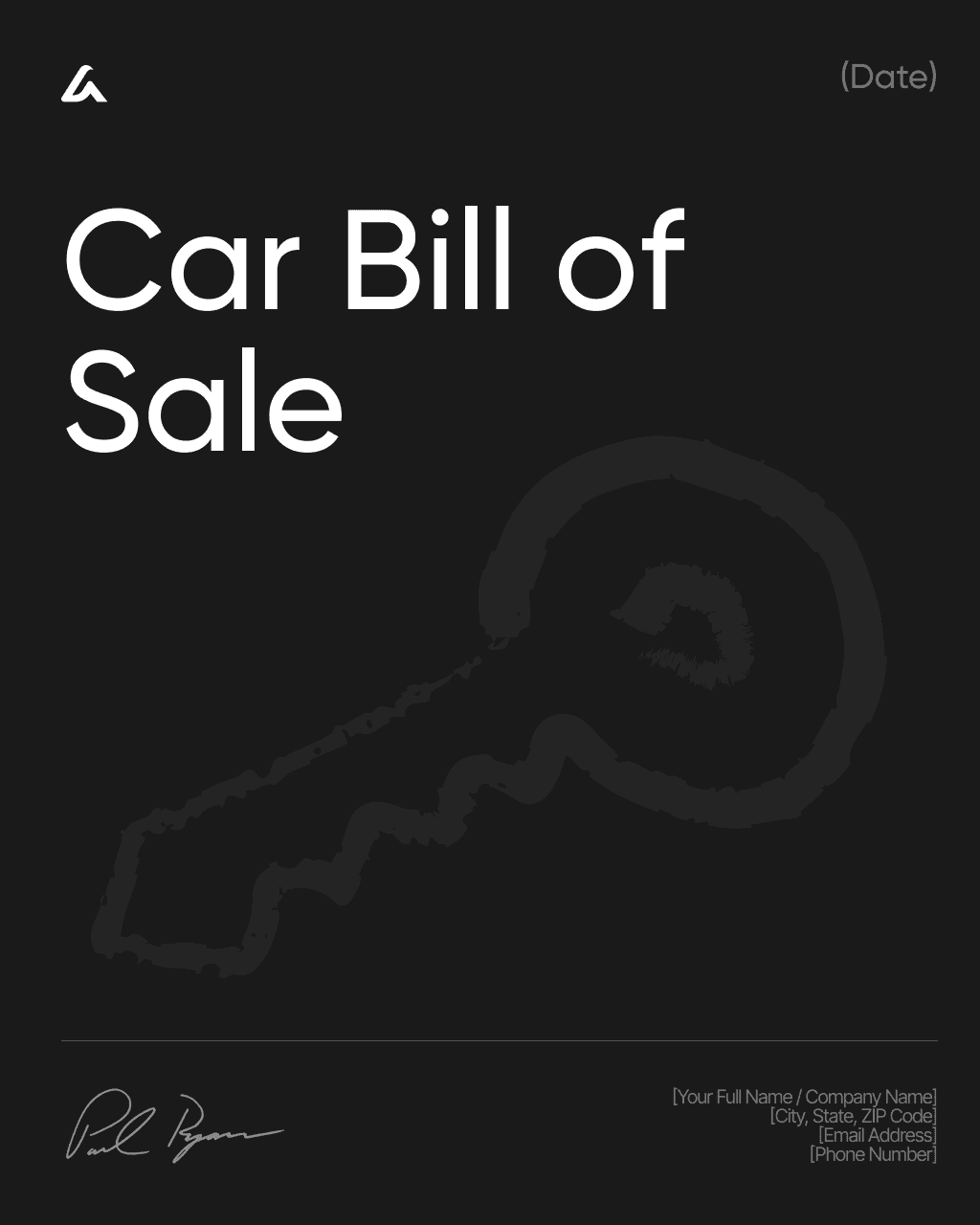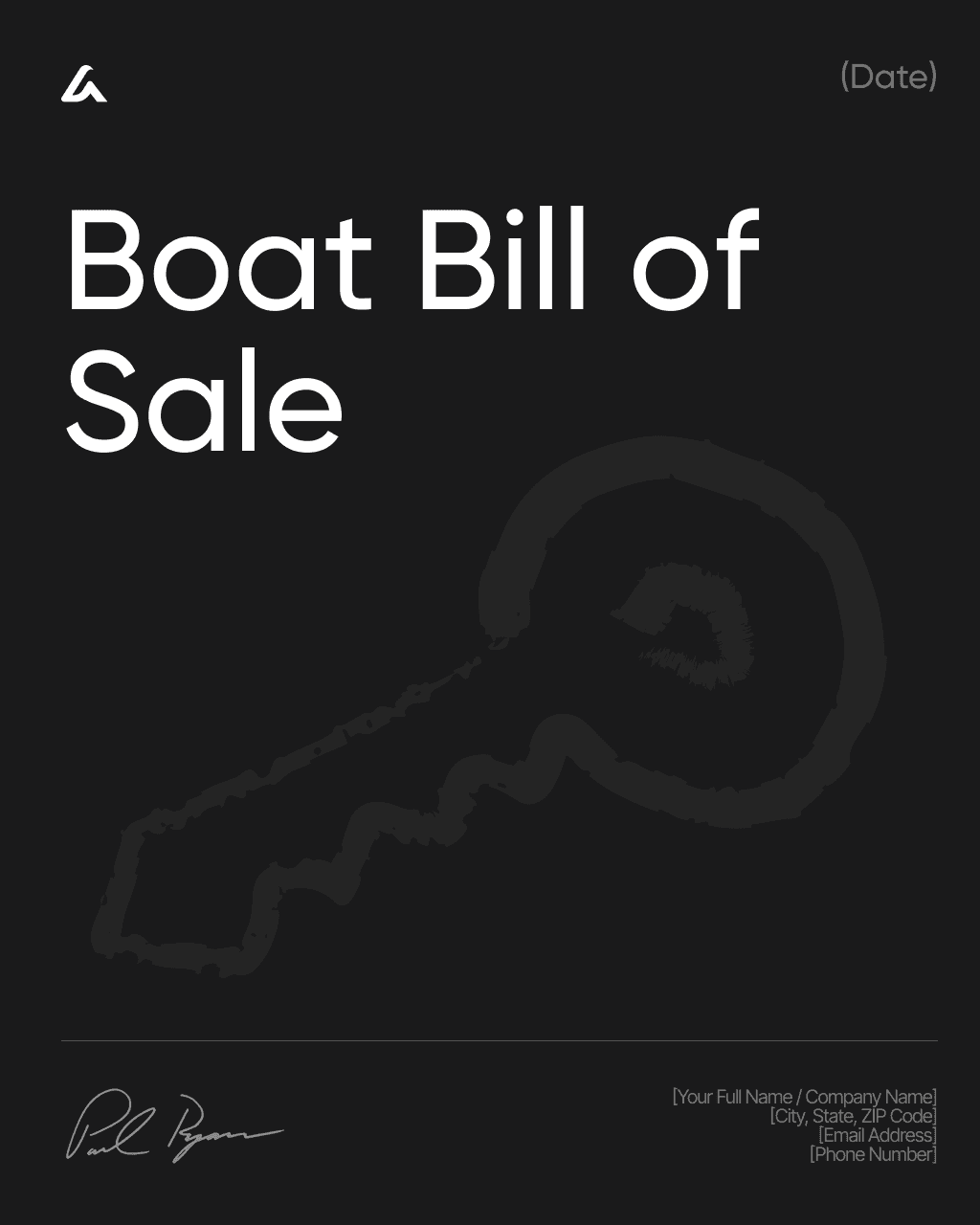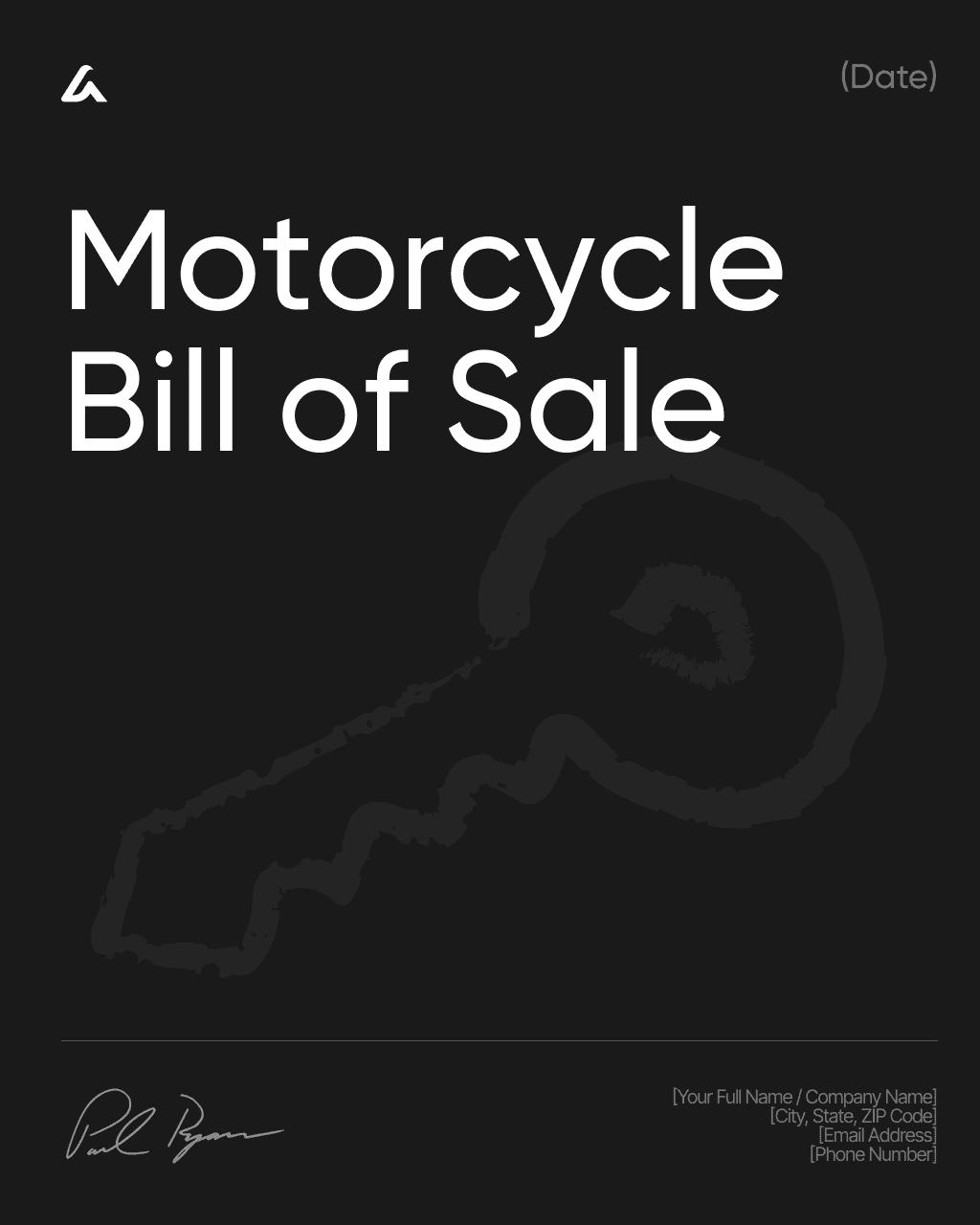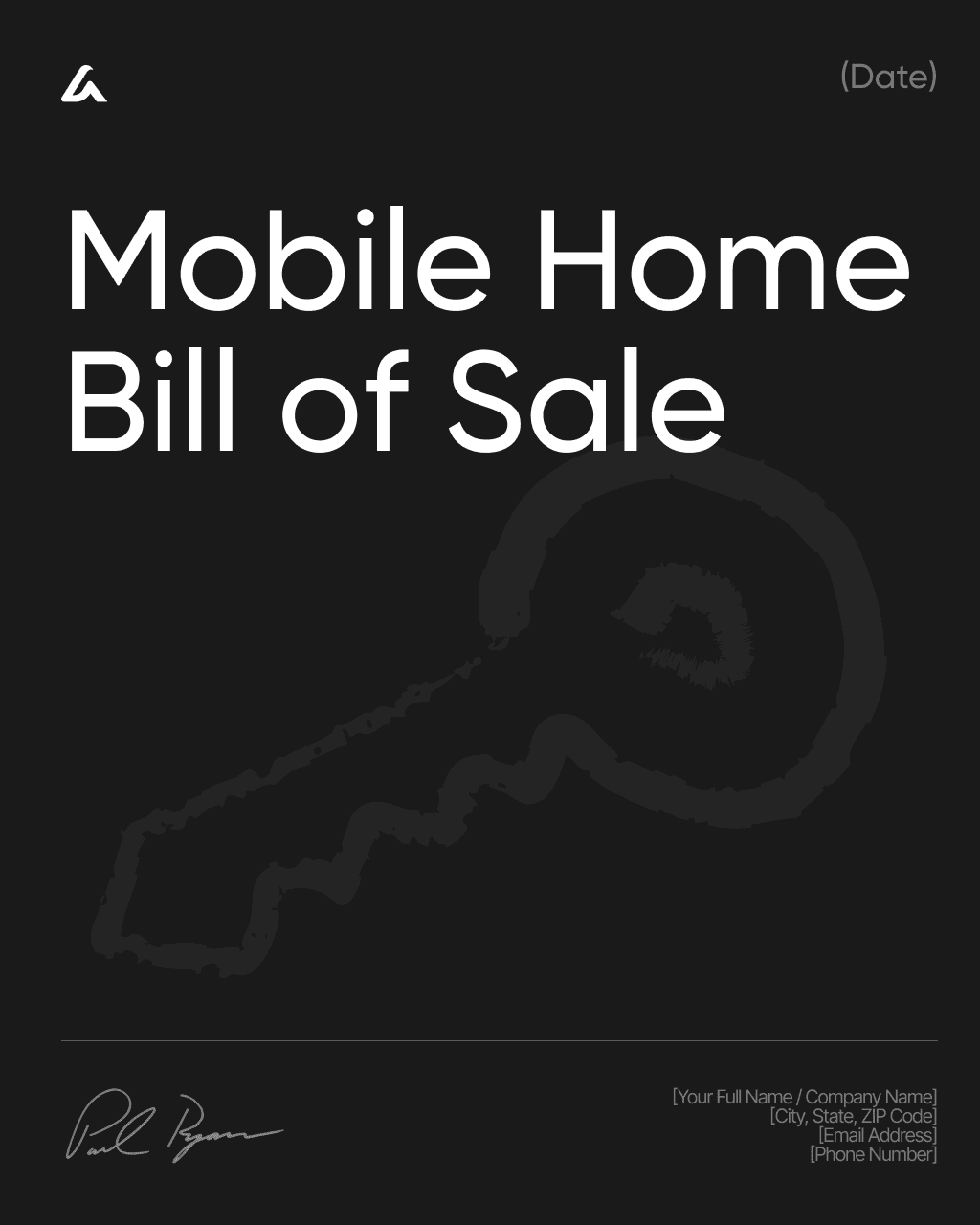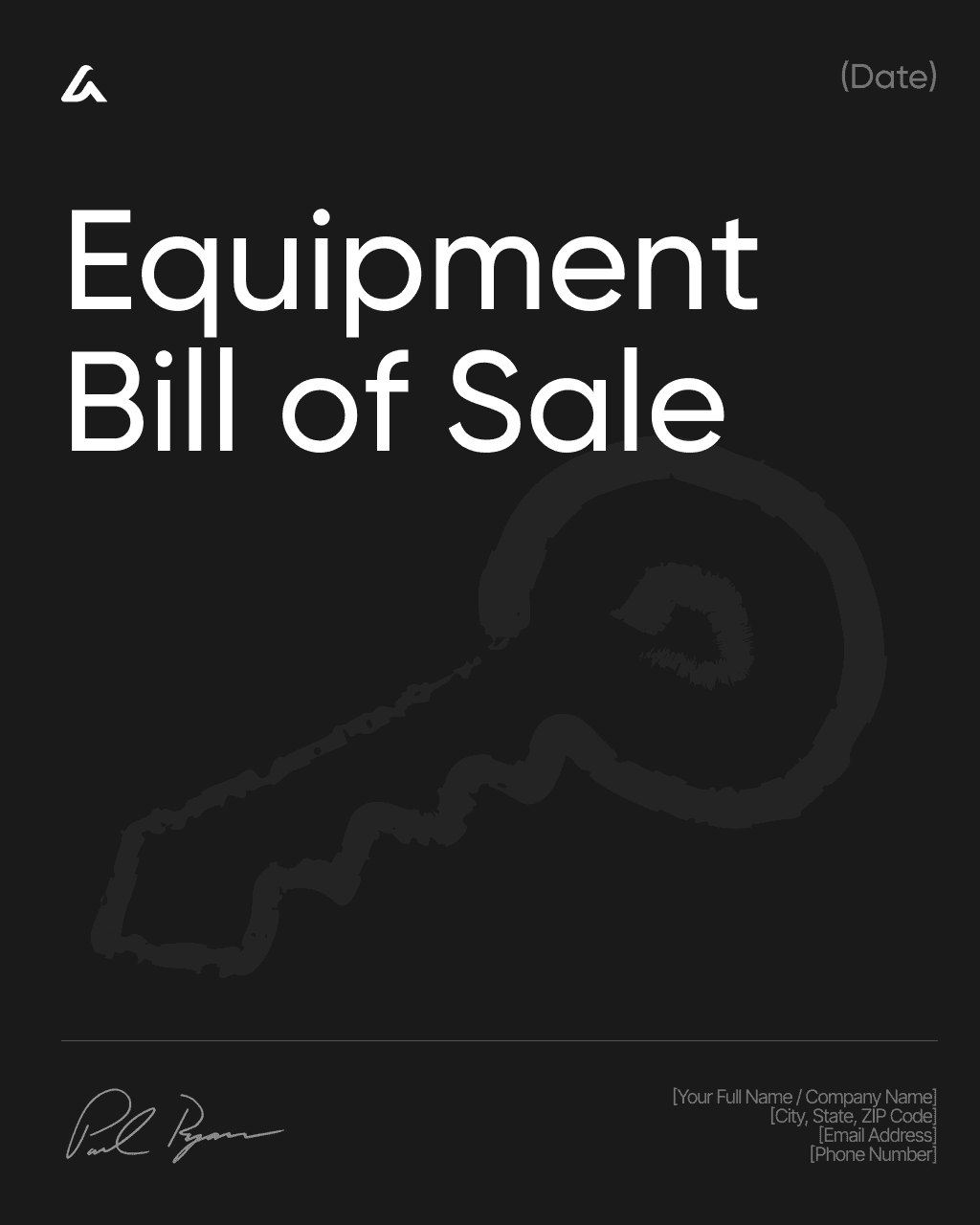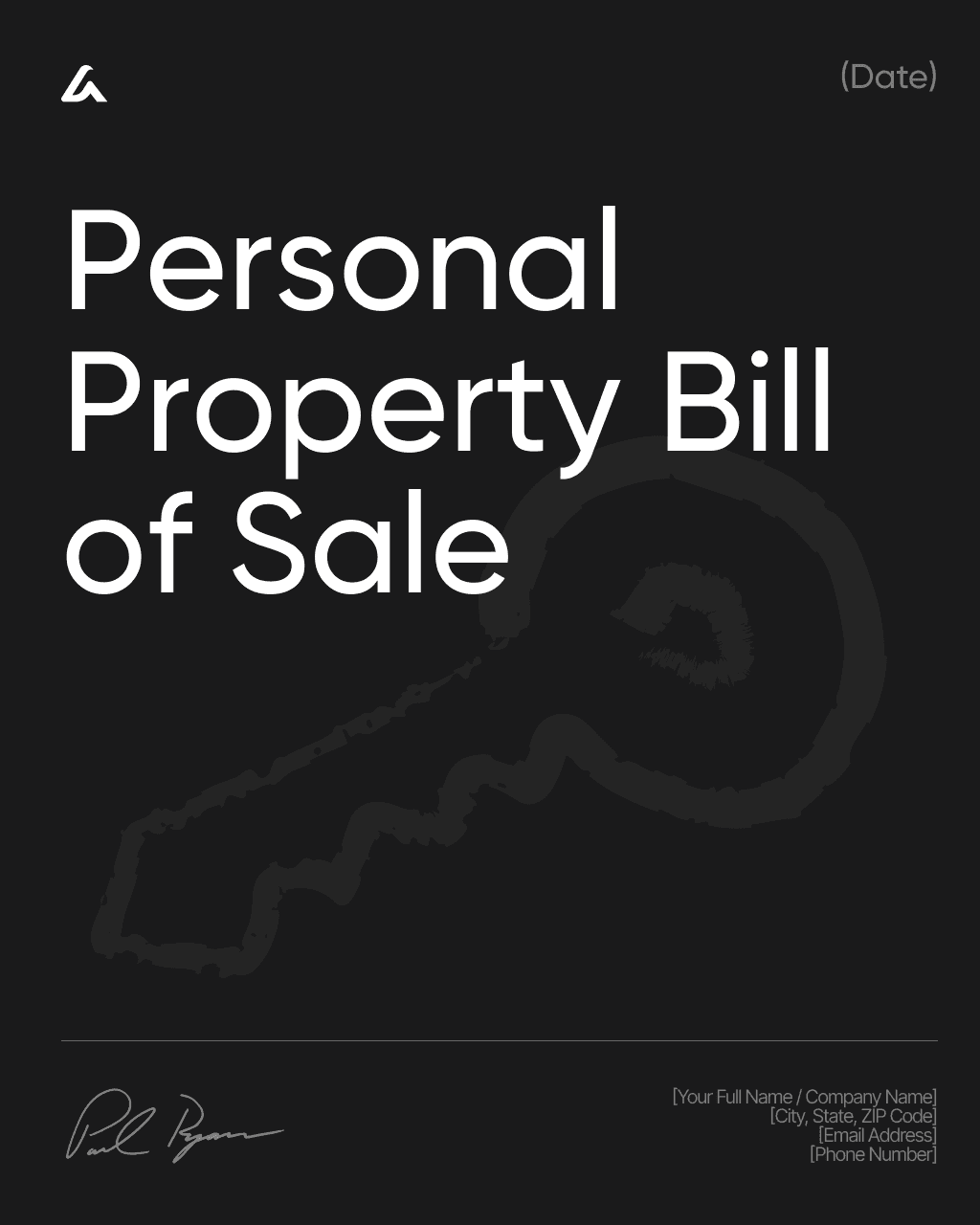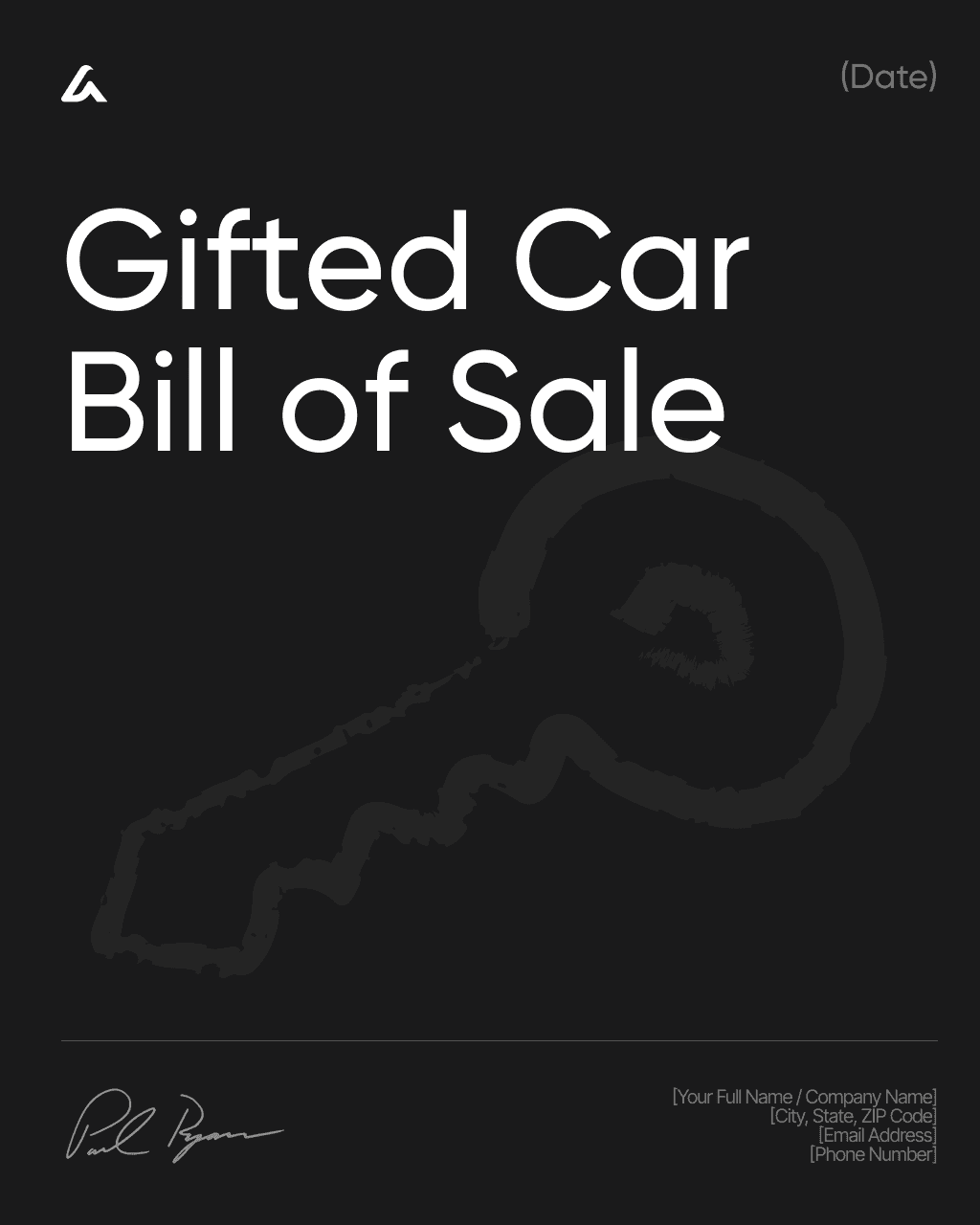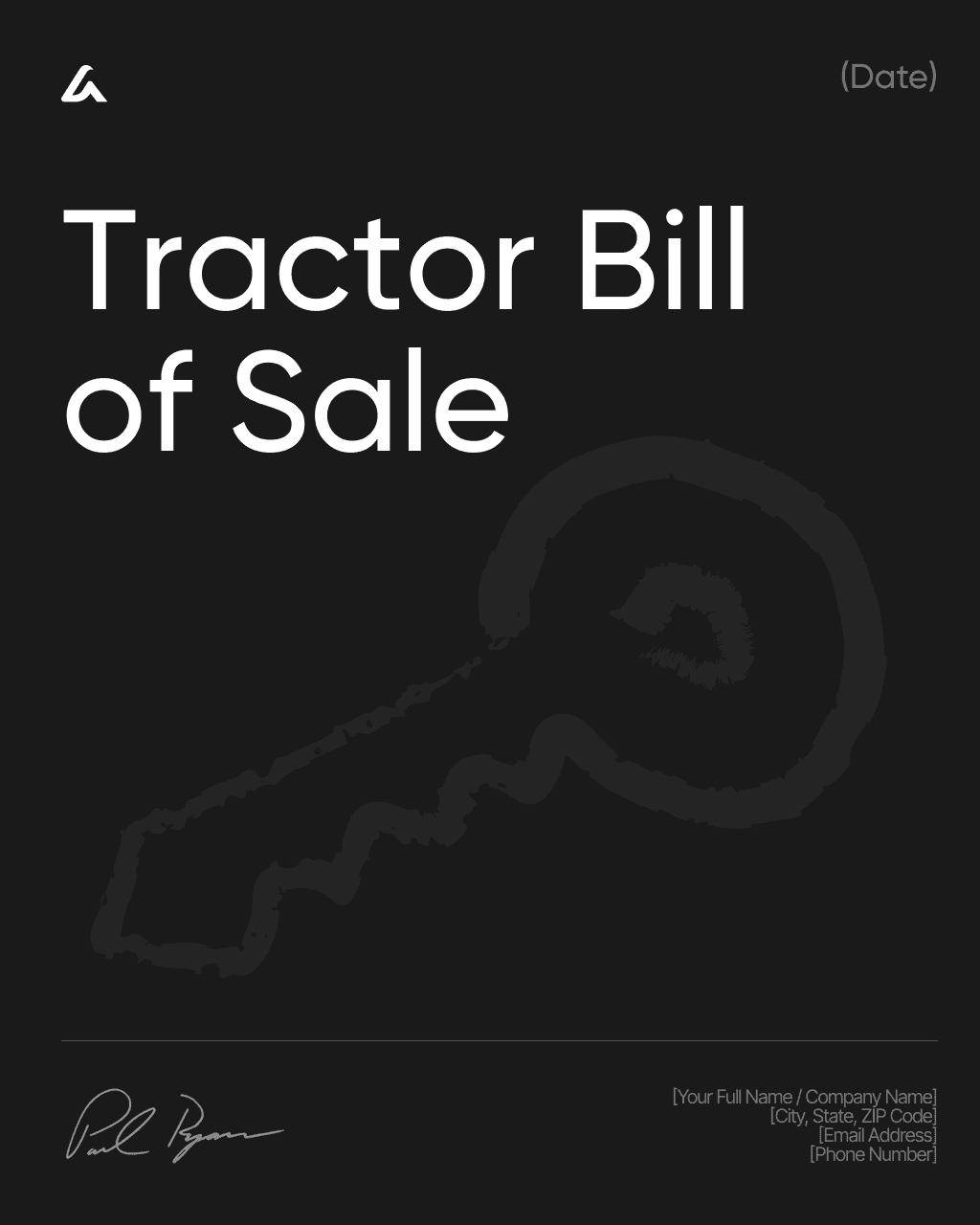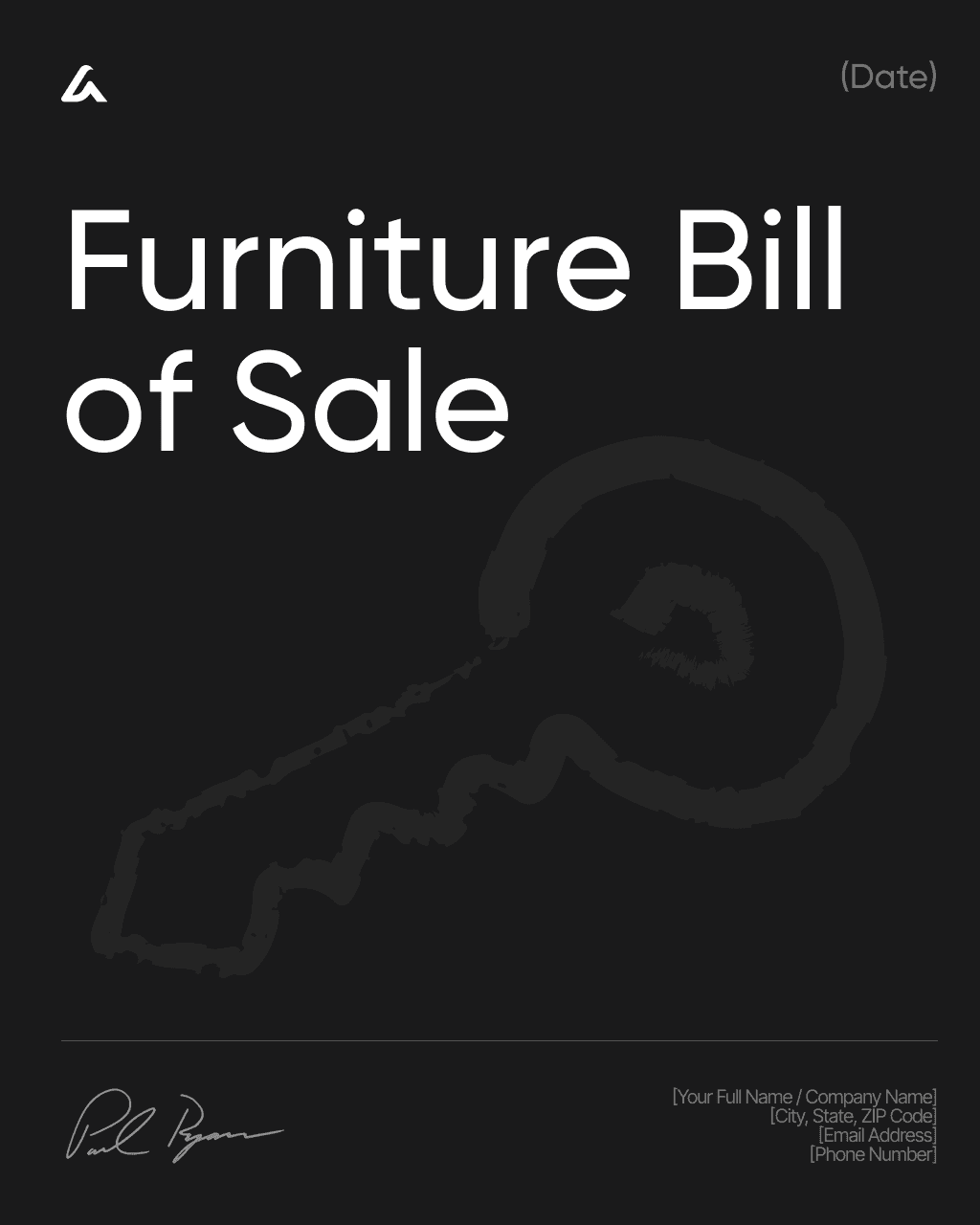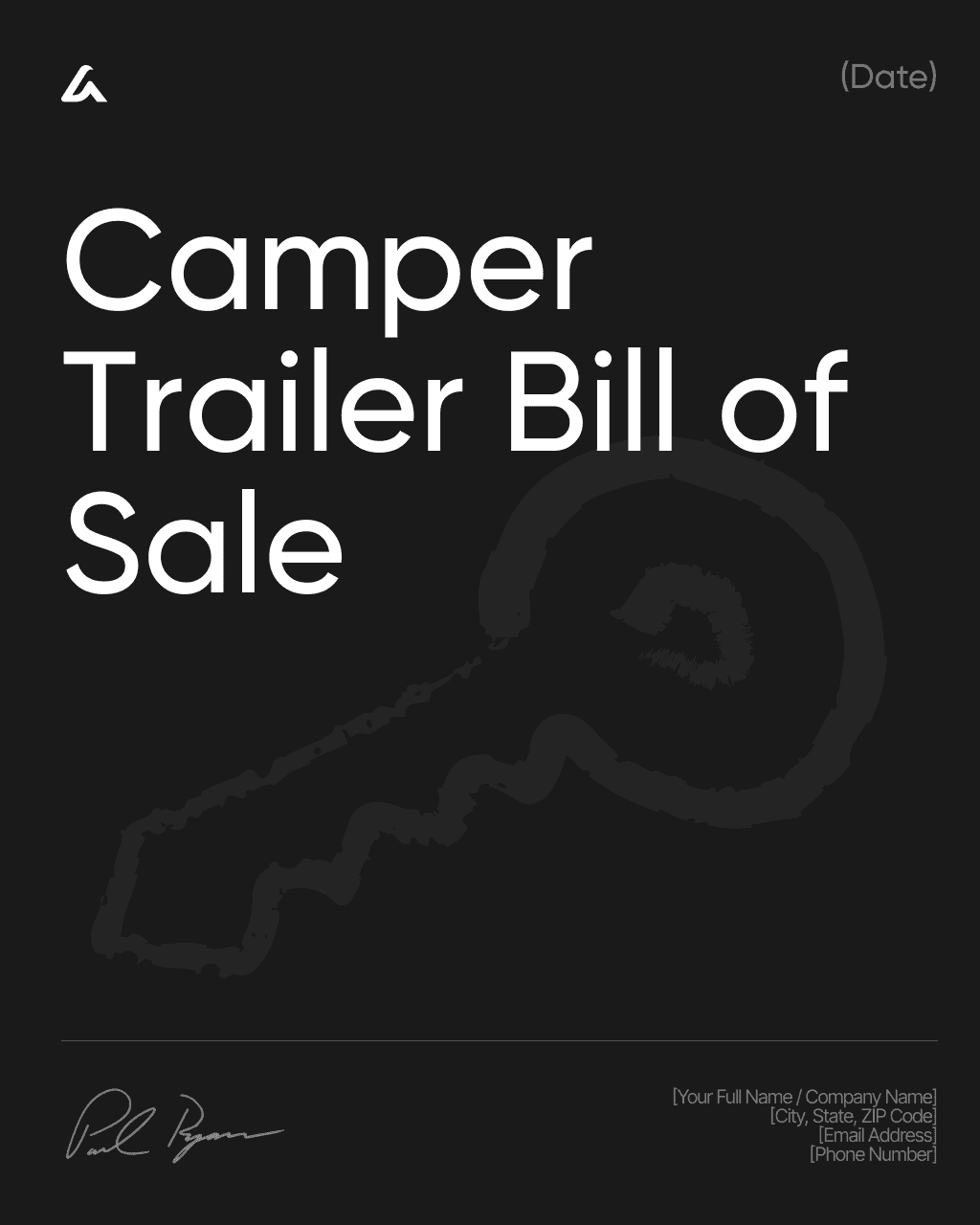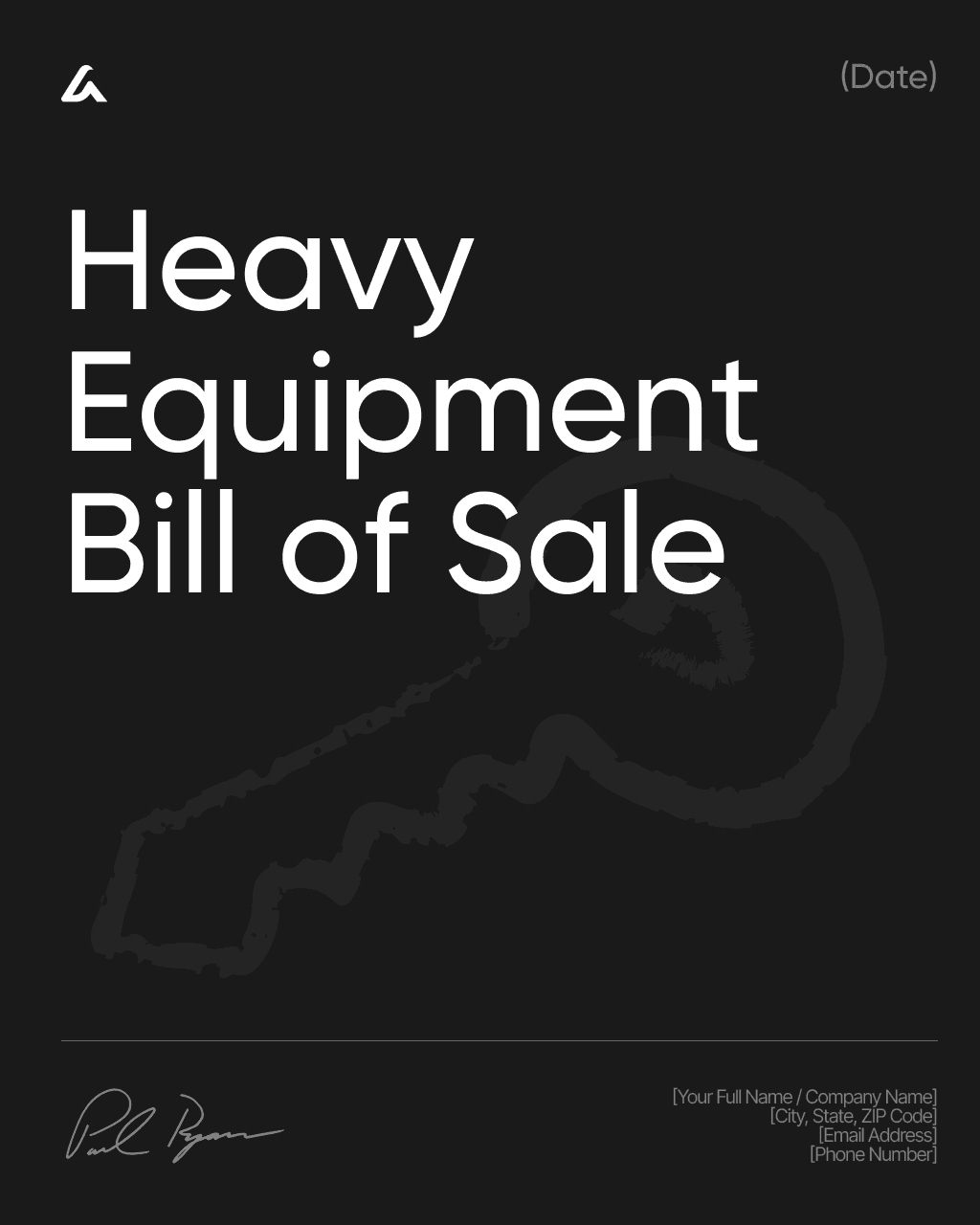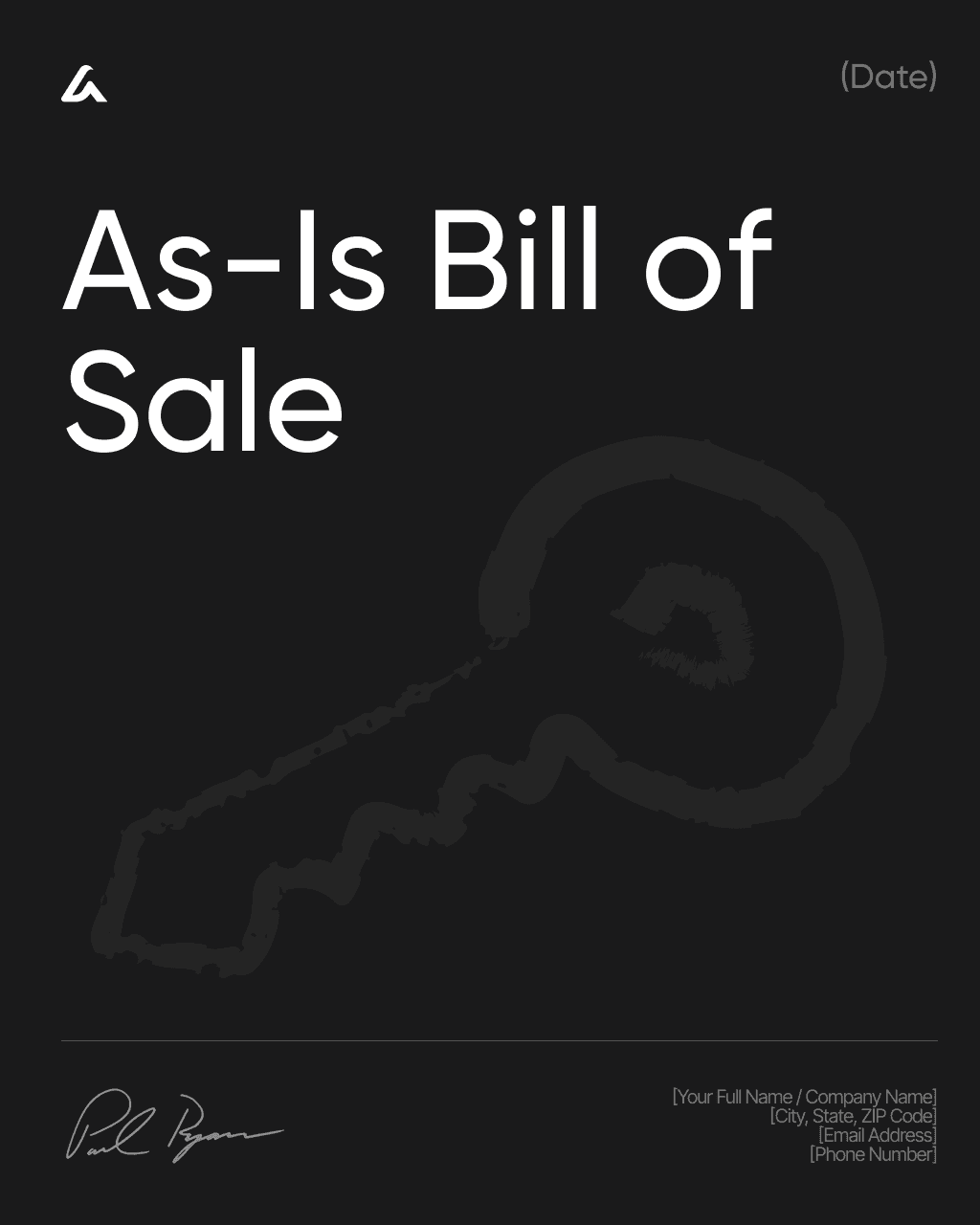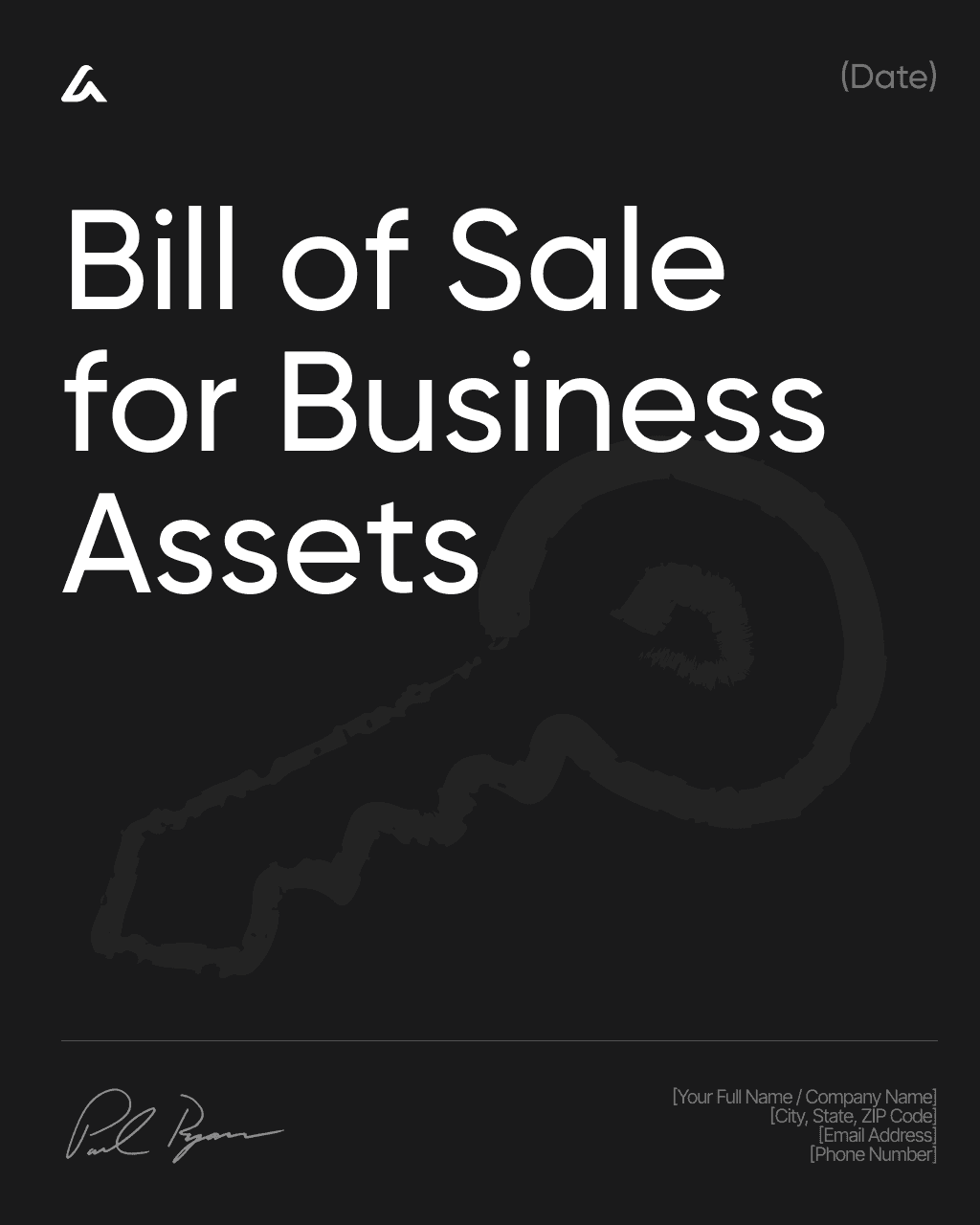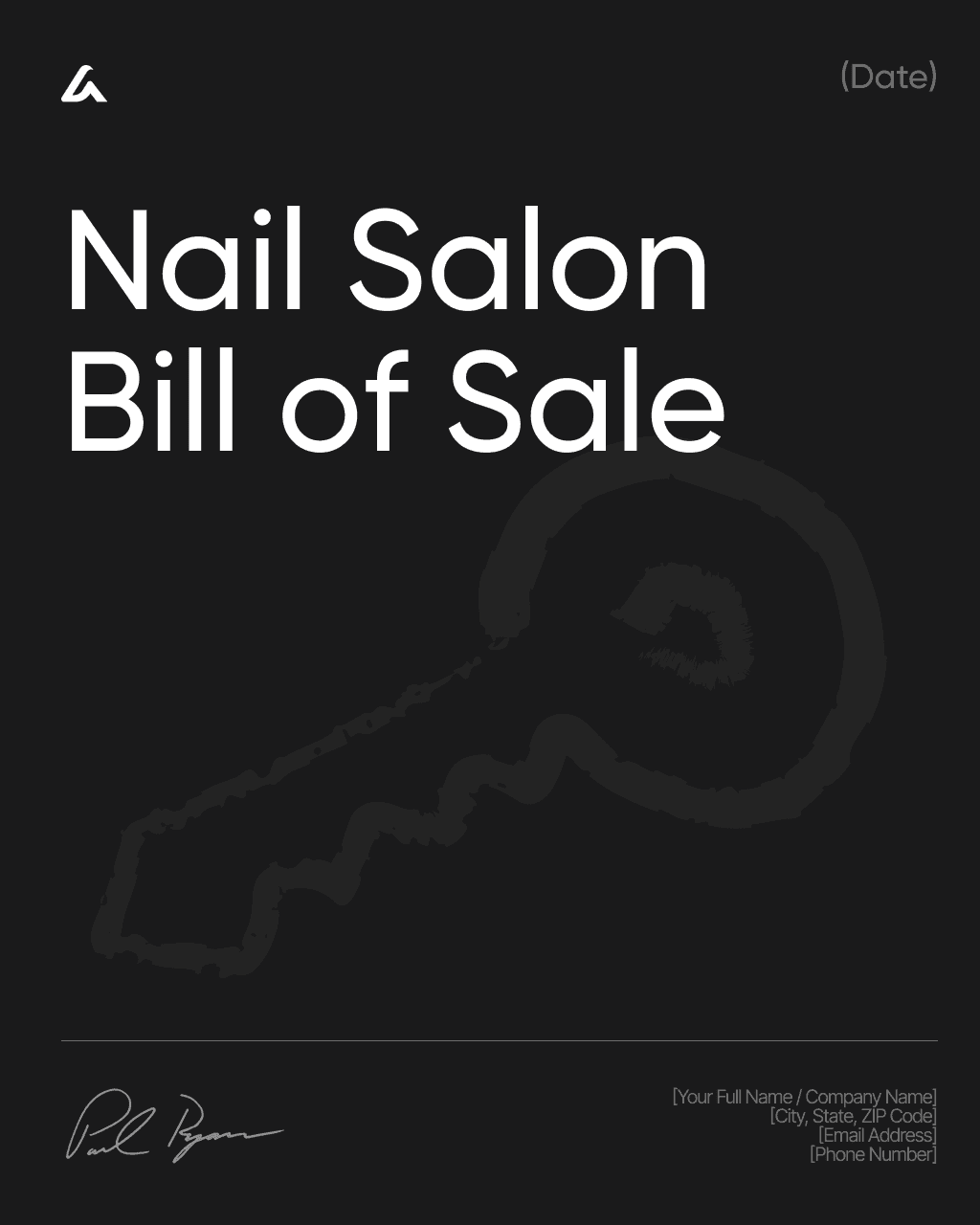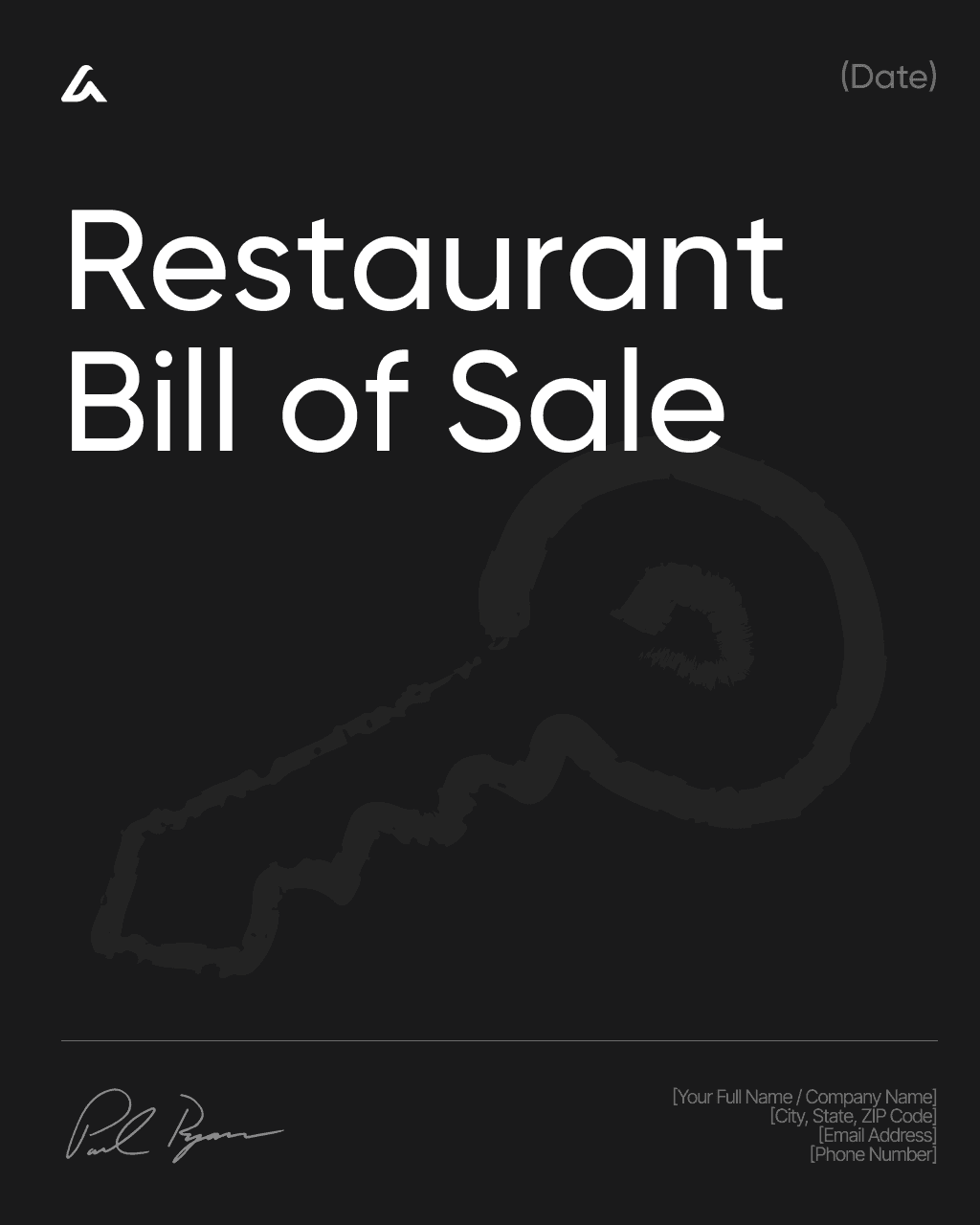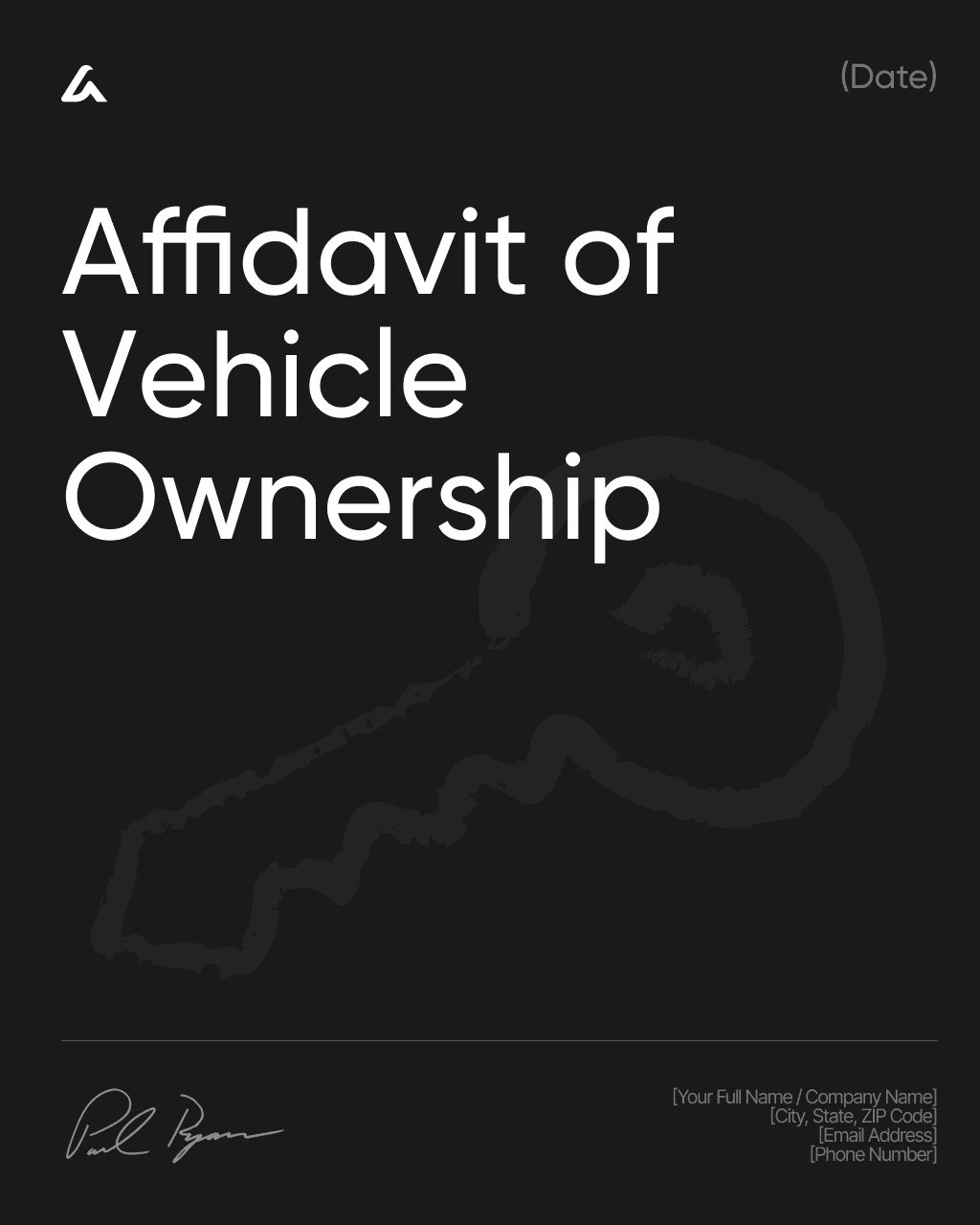Template category
Bill of Sale
Essential templates for invoices, receipts, order forms, client agreements, and more.
Bill of Sale
Table of Contents
1. Essential Overview: Why Bills of Sale Matter in Personal and Business Transactions
1.1 Vehicle Bill of Sale
1.2 General Bill of Sale
1.3 Warranty Bill of Sale
1.4 Car Bill of Sale Template
1.5 Boat Bill of Sale Template
1.6 Motorcycle Bill of Sale Template
1.7 Mobile Home Bill of Sale Template
1.8 Equipment Bill of Sale Template
1.9 Personal Property Bill of Sale Template
1.10 Gifted Car Bill of Sale Template
1.11 Tractor Bill of Sale Template
1.12 Furniture Bill of Sale Template
1.13 Camper Trailer Bill of Sale Template
1.14 Heavy Equipment Bill of Sale Template
1.15 As-Is Bill of Sale Template
1.16 Bill of Sale for Business Assets Template
1.17 Nail Salon Bill of Sale Template
1.18 Restaurant Bill of Sale Template
1.19 Artwork Bill of Sale Template
1.20 Affidavit of Vehicle Ownership Template
2. State-Specific Requirements for Bills of Sale in the USA
2.1 West Coast: California and Washington
2.2 Northeast: New York
2.3 Southern States: Texas and Florida
2.4 Midwest: Illinois
3. 2024–2025 Developments: Digital Signatures, e-Titling & Verification
3.1 Blockchain-Based Asset Transfers
3.2 Online Notarization of Bills of Sale
3.3 Trends in Private-Party Auto Sales & Fraud Prevention
3.4 Rise of Peer-to-Peer Marketplaces & Consumer Protection
3.5 Law Enforcement Collaboration & Safe Exchange Zones
3.6 Growing Role of Verification Technology in Private Sales
4. Conclusion: Using AI Templates to Streamline and Secure Personal Property Transfers
1. Essential Overview: Why Bills of Sale Matter in Personal and Business Transactions
In both personal and commercial contexts, a Bill of Sale remains one of the most essential legal documents for confirming ownership transfer. It formalizes the sale of goods or personal property, ensuring that the seller has legally transferred their rights and that the buyer has provided valid payment. In essence, it acts as both a contract and a receipt — transforming a simple transaction into a legally recognized record.
A properly executed Bill of Sale provides certainty and protection for all parties involved. It clearly identifies the item sold, the price, the date, and the names of both buyer and seller. This clarity prevents confusion and disputes by documenting every critical element of the sale. Without one, buyers may face difficulties proving ownership, and sellers risk future liability for property they no longer possess.
In business settings, Bills of Sale are equally vital. They serve as proof of asset transfers between companies, ensuring accountability for equipment, vehicles, or other valuable items. These documents also support tax compliance, insurance coverage, and internal audits — helping businesses maintain transparent and verifiable records of their transactions.
Beyond their evidentiary value, Bills of Sale also fulfill important regulatory functions. Many states require them for the registration of vehicles, boats, or other property types. Even when not mandatory, having one simplifies registration, taxation, and ownership verification. It can also include clauses that specify whether the item is sold “as is” or with a warranty, providing further legal protection.
Today, modern AI-assisted drafting tools make it easier than ever to create accurate, state-compliant Bills of Sale. These intelligent templates guide users through each step — detailing parties, property descriptions, warranties, and signatures — while automatically adapting to local legal standards. Whether for personal transactions or business asset transfers, a well-drafted Bill of Sale ensures that every exchange is valid, transparent, and enforceable.
Quick Highlights
Proof of Ownership: Confirms the buyer’s legal rights to the property and provides a written record of transfer.
Mutual Protection: Clearly defines sale terms, item condition, and responsibilities to prevent disputes.
Regulatory Compliance: Satisfies registration, tax, and licensing requirements in applicable jurisdictions.
Dispute Prevention: Provides a permanent record of the transaction, protecting both parties in case of conflict.
AI-Enhanced Drafting: Intelligent templates ensure documents meet all statutory requirements for a valid and secure sale.
Related Legal Resources
If you're also working with confidentiality or legal authority documents, check out these AI-generated legal guides:
1.1 Vehicle Bill of Sale

A Vehicle Bill of Sale is a notarized legal document that formally records the sale and transfer of ownership of a motor vehicle, such as a car, motorcycle, or truck. It confirms that the seller has conveyed ownership to the buyer for a stated price, date, and condition of the vehicle. As one of the most common and essential forms of bill of sale, it includes key identifying details — the make, model, year, Vehicle Identification Number (VIN), odometer reading, and the names and signatures of both parties. The document may also contain a warranty or “as-is” clause, clearly defining the condition under which the vehicle is sold. Because motor vehicles are regulated assets, many jurisdictions require a bill of sale to accompany the title transfer for registration or tax purposes. This record provides legal protection to both sides, proving that the buyer lawfully acquired the vehicle and that the seller is released from future liability once the sale is complete.
Using a structured Vehicle Bill of Sale Template ensures that every required field, disclosure, and clause is included in compliance with state and federal standards. It minimizes the risk of registration delays, ownership disputes, or fraud by standardizing all essential details in one document. Modern AI-assisted drafting tools make it easy to generate accurate, jurisdiction-specific forms with built-in odometer statements, notary sections, and signature blocks. With such a template, both private individuals and businesses can complete secure, legally recognized vehicle sales quickly and confidently — knowing that every step of the ownership transfer is properly documented and enforceable.
Download Template: Vehicle Bill of Sale
Each state has its own rules and nuances — what’s valid in California might not hold in Texas or New York. Choose your jurisdiction-specific sample version for full compliance: California | New York | Texas | Florida | Illinois | Washington
For more information please refer to our article: The Essential Guide to Vehicle Bill of Sale | AI Lawyer Insights
Or create your own document yourself with the help of AI.
1.2 General Bill of Sale

A General Bill of Sale, sometimes called a Personal Property Bill of Sale, is a versatile legal document used to record the sale or transfer of virtually any type of personal property. Unlike vehicle- or vessel-specific forms, it applies to everyday transactions — such as selling furniture, electronics, tools, collectibles, or other valuable items — between private individuals or businesses. It typically lists the names and addresses of the buyer and seller, the date of sale, a clear description of the item (including any serial numbers or identifying marks), the purchase price, and both parties’ signatures. Many include an “as-is” clause or limited warranty statement, confirming that the buyer accepts the property in its current condition. This document serves as written evidence of the transaction, proving that ownership has changed hands and protecting both parties from future disputes over payment, delivery, or condition.
Using a structured General Bill of Sale Template brings clarity and professionalism to even the simplest private sale. It ensures all essential elements — from identification of goods to price, conditions, and signatures — are properly recorded, reducing the risk of misunderstandings or legal complications. Modern AI-assisted templates make it easy to generate customized, state-compliant documents that meet all basic legal standards for proof of ownership transfer. Whether you’re selling personal items, equipment, or small business assets, a well-prepared General Bill of Sale turns an informal agreement into a formal, enforceable record — safeguarding both sides with one simple, complete document.
Download Template: General Bill of Sale
For more information please refer to our article: General Bill of Sale - Where and When to Use?
Or create your own document yourself with the help of AI.
1.3 Warranty Bill of Sale

A Warranty Bill of Sale is a formal legal document used when the seller guarantees that they hold clear title to the property being sold and that it is free of any claims, liens, or encumbrances. Unlike an “as-is” bill of sale, this form includes explicit warranties that the seller has full legal ownership and the right to transfer the item, and that the property will not later be subject to ownership disputes. It is most often used for high-value assets — such as vehicles, equipment, or valuable personal property — where the buyer requires additional legal assurance. The document typically specifies the item’s details, the sale price, the date of sale, and both parties’ information, along with the seller’s warranty statement affirming lawful ownership and freedom from defects in title.
Using a Warranty Bill of Sale Template adds significant legal protection and confidence to any transaction. It ensures that the warranty language is properly worded and that all statutory requirements are met to make the warranty enforceable. For buyers, it provides recourse if ownership issues arise after the sale; for sellers, it formalizes their representations and prevents misunderstandings about what is being guaranteed. Modern AI-assisted templates allow users to create clear, jurisdiction-specific warranty bills of sale that combine ownership assurance with accurate documentation. The result is a professional, legally binding record that safeguards both parties and confirms the integrity of the transaction.
Download Template: Warranty Bill of Sale
For more information please refer to our article:
Or create your own document yourself with the help of AI.
1.4 Car Bill of Sale Template
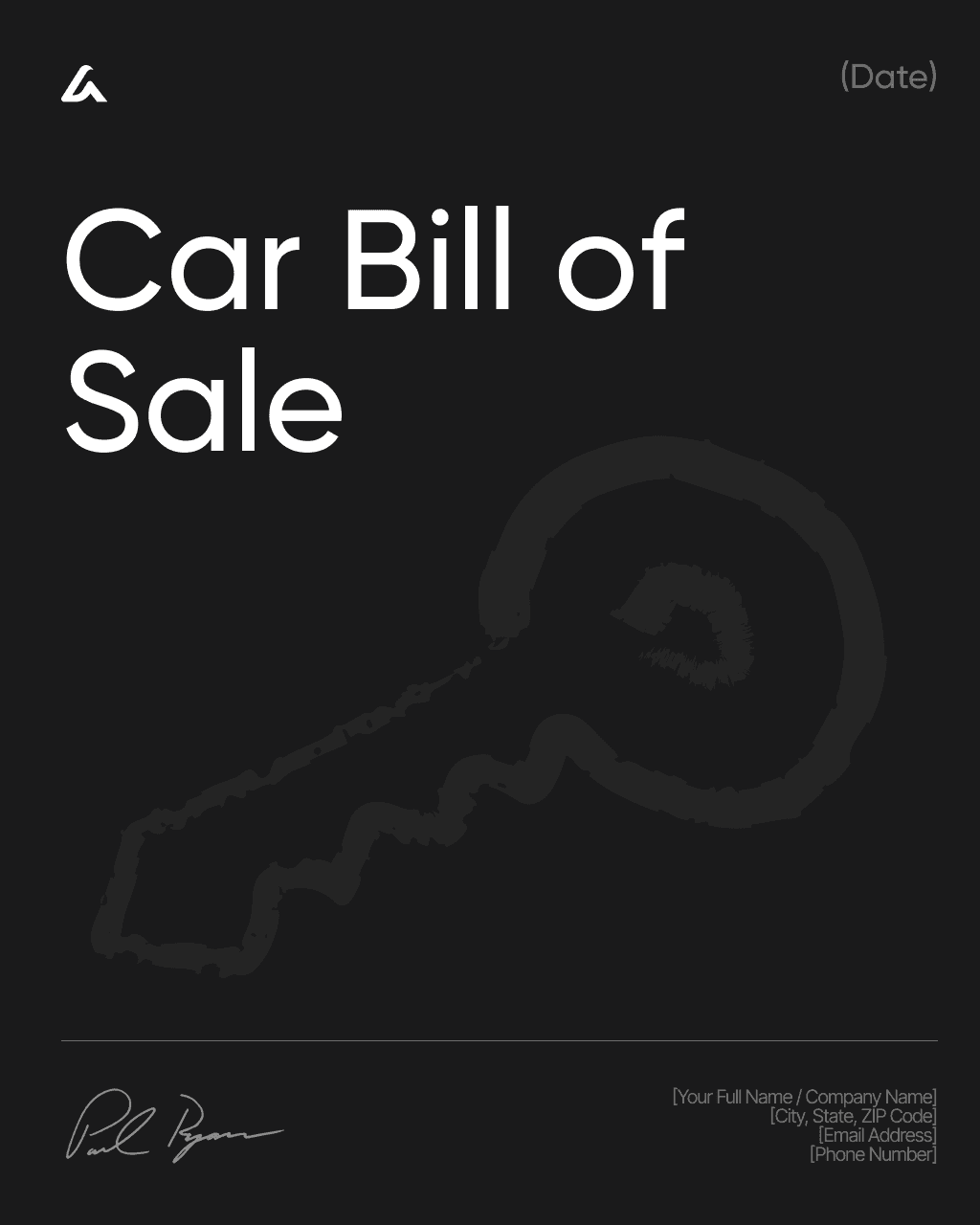
A Car Bill of Sale is a written document that records the transfer of ownership of a motor vehicle from a seller to a buyer. It serves as proof that the transaction occurred and typically includes key details about the vehicle, the parties, and the purchase price. This document is commonly used in private vehicle sales, dealership transactions, and gifting scenarios, and it may be required for title transfer, registration, or tax purposes depending on the jurisdiction. Its purpose is to provide a clear, legally recognized record of the sale and protect both parties in case of future disputes.
Using a standardized Car Bill of Sale template ensures that all essential information is included - the seller and buyer names and addresses, vehicle details (make, model, year, VIN, odometer reading), purchase price, date of sale, and payment method. The template may also include “as-is” sale language, warranties or disclaimers, disclosure of known defects, lien status, and signatures from both parties. AI-powered tools like AI Lawyer help users create accurate, professional bills of sale that follow common legal requirements and documentation standards, reducing risk and supporting smooth title transfer and registration.
Download Template: Car Bill of Sale Template
For more information please refer to our article: Bill of Sale: Templates, Tips, and Key Terms for U.S. Sales
Or create your own document yourself with the help of AI.
1.5 Boat Bill of Sale Template
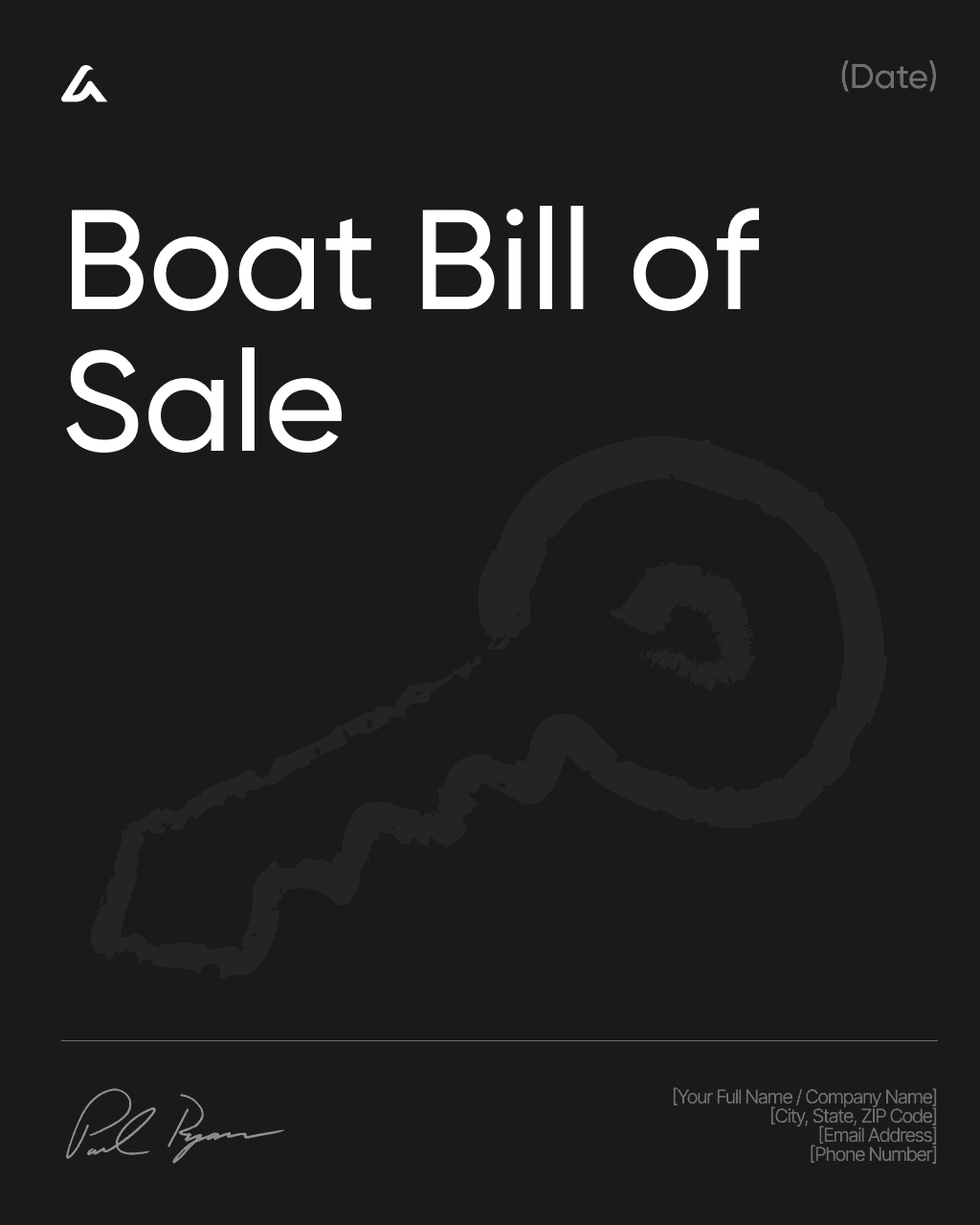
A Boat Bill of Sale is a legal document used to record the transfer of ownership of a boat from a seller to a buyer. It serves as written proof that the sale has taken place and typically includes key details such as the identities of the buyer and seller, a description of the vessel, the purchase price, and the date of transfer. This document is commonly required for registering the boat, transferring title, and demonstrating lawful ownership. The primary purpose of a boat bill of sale is to protect both parties by clearly documenting the terms of the transaction and reducing the risk of future disputes.
Using a standardized Boat Bill of Sale template ensures that all essential information is captured in a clear and legally appropriate format - including the boat’s make, model, year, hull identification number (HIN), registration number, and any included equipment such as trailers or motors. The template may also address representations about condition, “as-is” sale terms, warranties or disclaimers, and signatures of both parties. AI-powered legal drafting tools like AI Lawyer help users generate customized boat bills of sale that comply with state or country-specific requirements, ensuring the document is suitable for registration and record-keeping. By guiding users through the necessary details and producing precise legal language, the platform helps create a professional, reliable document that supports a smooth transfer of ownership and provides peace of mind for both buyer and seller.
Download Template: Boat Bill of Sale Template
For more information please refer to our article: Bill of Sale: Templates, Tips, and Key Terms for U.S. Sales
Or create your own document yourself with the help of AI.
1.6 Motorcycle Bill of Sale Template
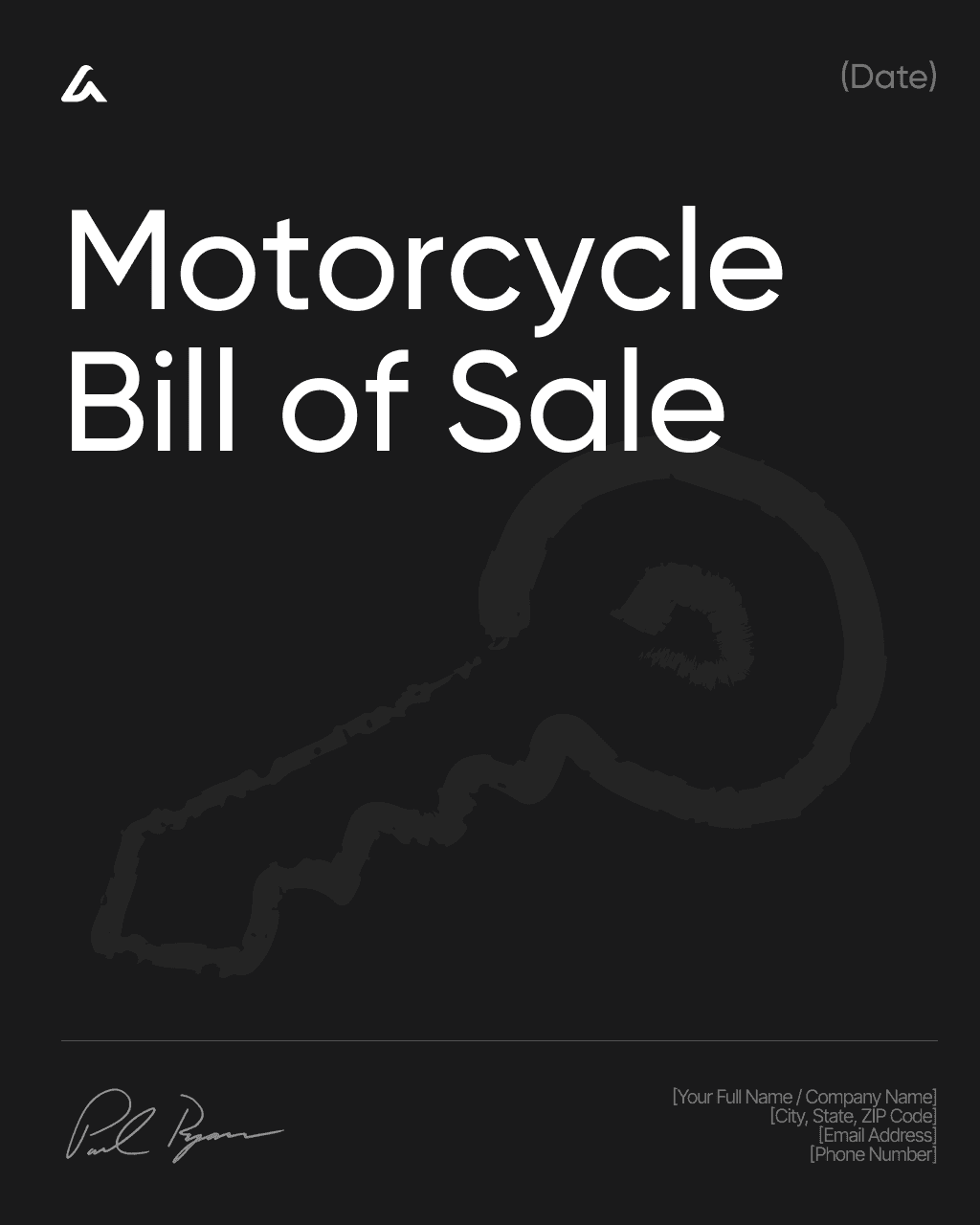
A Motorcycle Bill of Sale is a legal document used to formally record the transfer of ownership of a motorcycle from a seller to a buyer. It provides written evidence of the transaction and is often required for vehicle registration, title transfer, and proof of purchase. This document helps protect both parties by clearly stating the terms of the sale, confirming the change of ownership, and reducing the risk of disputes related to payment, condition, or ownership history.
Using a standardized Motorcycle Bill of Sale template ensures that all critical details are properly documented - including the identities of the buyer and seller, the motorcycle’s make, model, year, vehicle identification number (VIN), mileage, sale price, and date of transfer. The template may also include “as-is” sale language, warranty disclaimers, and statements regarding liens or encumbrances. AI-powered legal drafting tools like AI Lawyer assist users in generating jurisdiction-specific motorcycle bills of sale that align with local motor vehicle requirements. By guiding users step by step and applying clear legal language, the platform helps produce a professional, reliable document that supports a smooth ownership transfer and provides legal clarity for both parties.
Download Template: Motorcycle Bill of Sale Template
For more information please refer to our article: Bill of Sale: Templates, Tips, and Key Terms for U.S. Sales
Or create your own document yourself with the help of AI.
1.7 Mobile Home Bill of Sale Template

A Mobile Home Bill of Sale is a legal document used to record the transfer of ownership of a mobile or manufactured home from a seller to a buyer. It serves as official proof that the sale has occurred and is often required for title transfer, registration, tax purposes, or placement within a mobile home park. This document is especially important because mobile homes may be treated as either personal property or real property depending on jurisdiction, making clear documentation essential. The primary purpose of a mobile home bill of sale is to establish ownership, document the agreed purchase terms, and protect both parties from future disputes.
Using a standardized Mobile Home Bill of Sale template ensures that all essential details are clearly included - such as the names and addresses of the buyer and seller, a detailed description of the mobile home (make, model, year, size, serial or VIN number), the sale price, and the date of transfer. The template may also address whether the home is sold with or without land, any existing liens, “as-is” sale terms, and responsibility for taxes or fees. AI-powered legal drafting tools like AI Lawyer help users generate customized mobile home bills of sale that align with state or regional requirements, including notarization or witness provisions where required. By guiding users through the necessary information and producing clear, legally appropriate language, the platform helps create a reliable document that supports proper title transfer and provides confidence for both buyer and seller.
Download Template: Mobile Home Bill of Sale Template
For more information please refer to our article: Bill of Sale: Templates, Tips, and Key Terms for U.S. Sales
Or create your own document yourself with the help of AI.
1.8 Equipment Bill of Sale Template

An Equipment Bill of Sale is a legal document used to record the sale and transfer of ownership of equipment from a seller to a buyer. It is commonly used for transactions involving business, industrial, agricultural, construction, or office equipment. This document serves as proof of purchase and ownership and may be required for accounting, tax reporting, financing, or insurance purposes. The primary purpose of an equipment bill of sale is to clearly document the terms of the transaction, establish ownership, and protect both parties from future disputes regarding condition, payment, or title.
Using a standardized Equipment Bill of Sale template ensures that all essential details are properly documented - including the names and contact information of the buyer and seller, a detailed description of the equipment (type, make, model, serial number, and condition), the purchase price, and the date of transfer. The template may also include “as-is” sale provisions, warranty disclaimers, representations about ownership and liens, and payment terms if applicable. AI-powered legal drafting tools like AI Lawyer help users generate customized equipment bills of sale tailored to specific industries and jurisdictions. By guiding users through the required information and applying clear legal language, the platform helps create a professional, reliable document that supports smooth ownership transfer, accurate record-keeping, and legal clarity for both parties.
Download Template: Equipment Bill of Sale Template
For more information please refer to our article: Bill of Sale: Templates, Tips, and Key Terms for U.S. Sales
Or create your own document yourself with the help of AI.
1.9 Personal Property Bill of Sale Template
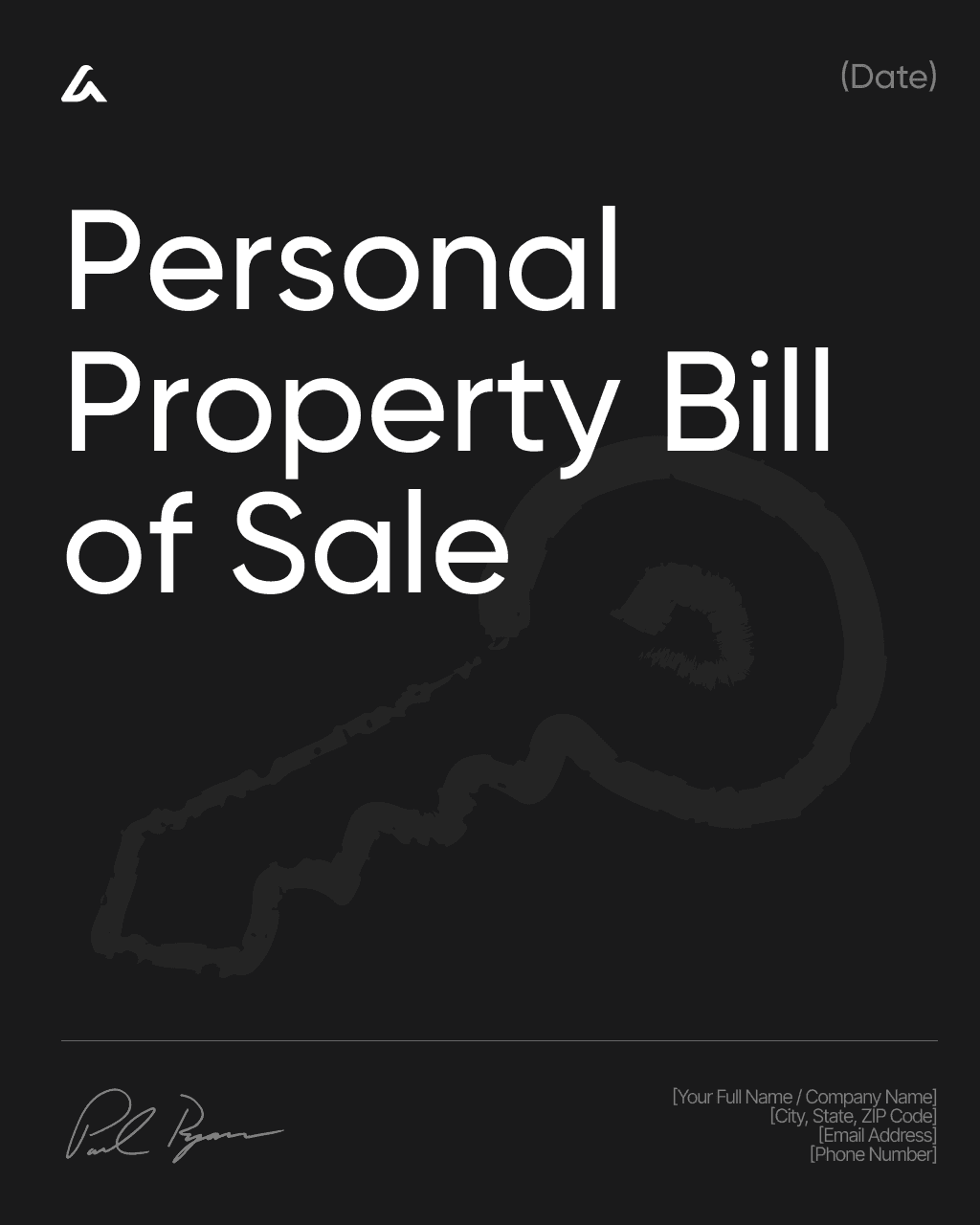
A Personal Property Bill of Sale is a legal document used to record the transfer of ownership of personal, movable property from a seller to a buyer. It is commonly used for transactions involving items such as furniture, electronics, tools, appliances, collectibles, or other valuable personal belongings. This document serves as proof that the sale took place and helps establish lawful ownership, which can be important for record-keeping, insurance, or resolving future disputes. The primary purpose of a personal property bill of sale is to clearly document the transaction terms and protect both parties.
Using a standardized Personal Property Bill of Sale template ensures that all key details are included in a clear and organized format - including the names of the buyer and seller, a description of the property being sold, the sale price, and the date of transfer. The template may also include “as-is” sale language, warranty disclaimers, statements confirming the seller’s right to sell the property, and signatures of both parties. AI-powered legal drafting tools like AI Lawyer help users generate customized personal property bills of sale suited to different types of assets and jurisdictions. By guiding users through the necessary information and producing precise legal language, the platform helps create a professional, reliable document that provides legal clarity and peace of mind for both buyer and seller.
Download Template: Personal Property Bill of Sale Template
For more information please refer to our article: Bill of Sale: Templates, Tips, and Key Terms for U.S. Sales
Or create your own document yourself with the help of AI.
1.10 Gifted Car Bill of Sale Template
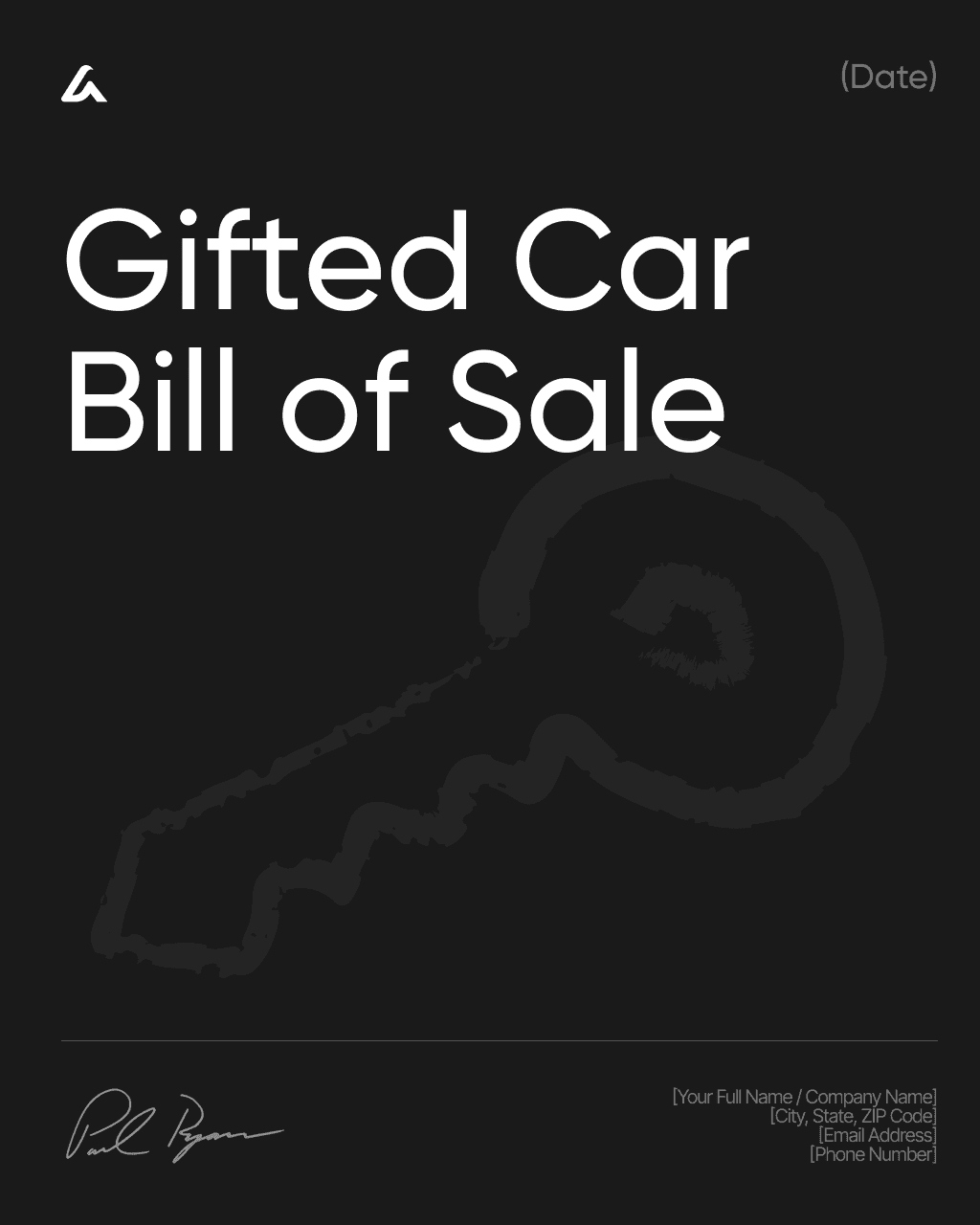
A Gifted Car Bill of Sale is a legal document used to record the transfer of ownership of a motor vehicle from one person to another when the vehicle is given as a gift rather than sold for payment. It serves as official proof of the transfer and is commonly required by motor vehicle authorities to update the title and registration, even when no money changes hands. The primary purpose of this document is to clearly establish the change of ownership, document the nature of the transfer as a gift, and help both parties comply with administrative, tax, or registration requirements.
Using a standardized Gifted Car Bill of Sale template ensures that all essential information is clearly documented - including the identities of the donor and recipient, a detailed description of the vehicle (make, model, year, VIN, and mileage), the date of transfer, and a statement confirming that the vehicle is being transferred as a gift with no purchase price. The template may also include disclosures about the vehicle’s condition, existing liens, and “as-is” transfer terms. AI-powered legal drafting tools like AI Lawyer help users generate jurisdiction-specific gifted car bills of sale that align with local motor vehicle and tax rules, including any required declarations or notarization. By guiding users through the required details and applying clear legal language, the platform helps create a reliable document that supports a smooth title transfer and provides legal clarity for both parties.
Download Template: Gifted Car Bill of Sale Template
For more information please refer to our article: Bill of Sale: Templates, Tips, and Key Terms for U.S. Sales
Or create your own document yourself with the help of AI.
1.11 Tractor Bill of Sale Template
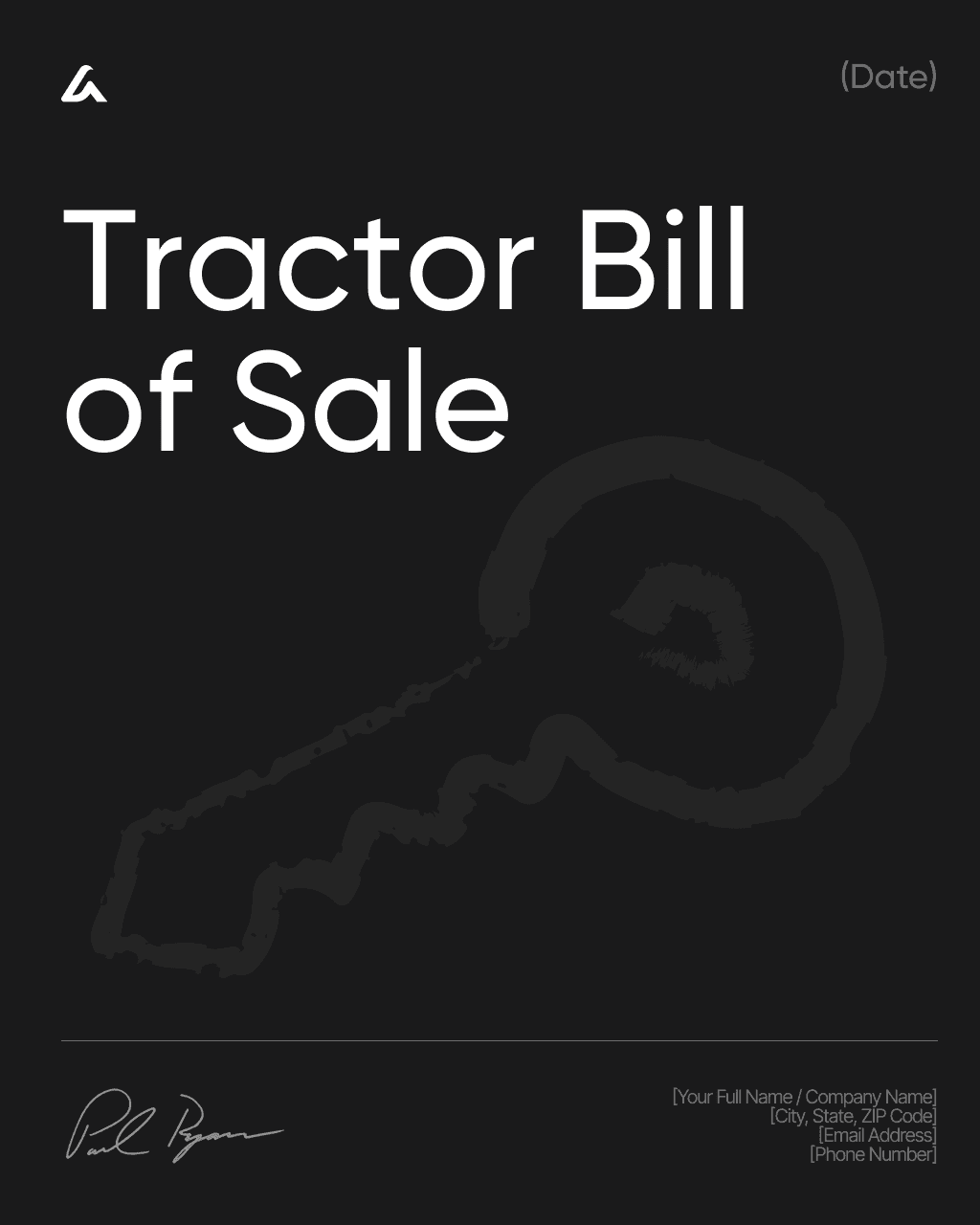
A Tractor Bill of Sale is a legal document used to record the transfer of ownership of a tractor from a seller to a buyer. It is commonly used for agricultural, farming, landscaping, or commercial equipment transactions and serves as proof of purchase and ownership. This document may be required for registration, financing, insurance, or tax reporting, depending on the jurisdiction and intended use of the tractor. The primary purpose of a tractor bill of sale is to clearly document the terms of the transaction and protect both parties from future disputes regarding ownership, condition, or payment.
Using a standardized Tractor Bill of Sale template ensures that all essential details are properly documented - including the names and addresses of the buyer and seller, a detailed description of the tractor (make, model, year, serial or identification number, and condition), the sale price, and the date of transfer. The template may also include “as-is” sale language, warranty disclaimers, statements regarding liens or encumbrances, and details about any included attachments or accessories. AI-powered legal drafting tools like AI Lawyer help users generate customized tractor bills of sale that comply with local requirements and industry practices. By guiding users through the necessary information and using clear legal language, the platform helps produce a professional, reliable document that supports smooth ownership transfer and legal clarity for both buyer and seller.
Download Template: Tractor Bill of Sale Template
For more information please refer to our article: Bill of Sale: Templates, Tips, and Key Terms for U.S. Sales
Or create your own document yourself with the help of AI.
1.12 Furniture Bill of Sale Template

A Furniture Bill of Sale is a legal document used to record the transfer of ownership of furniture from a seller to a buyer. It is commonly used for private sales involving items such as sofas, tables, beds, cabinets, office furniture, or antique and high-value pieces. This document serves as proof that the transaction has taken place and helps establish lawful ownership, which can be important for record-keeping, insurance purposes, or resolving future disputes. The primary purpose of a furniture bill of sale is to clearly document the terms of the sale and protect both parties.
Using a standardized Furniture Bill of Sale template ensures that all essential details are clearly included in an organized and legally appropriate format - such as the names and contact information of the buyer and seller, a description of the furniture (type, quantity, condition, brand or identifying features), the sale price, and the date of transfer. The template may also include “as-is” sale language, warranty disclaimers, and statements confirming the seller’s right to sell the items free of liens or claims. AI-powered legal drafting tools like AI Lawyer help users generate customized furniture bills of sale tailored to different transaction types and jurisdictions. By guiding users through the required information and producing clear legal language, the platform helps create a professional, reliable document that supports smooth ownership transfer and provides peace of mind for both buyer and seller.
Download Template: Furniture Bill of Sale Template
For more information please refer to our article: Bill of Sale: Templates, Tips, and Key Terms for U.S. Sales
Or create your own document yourself with the help of AI.
1.13 Camper Trailer Bill of Sale Template
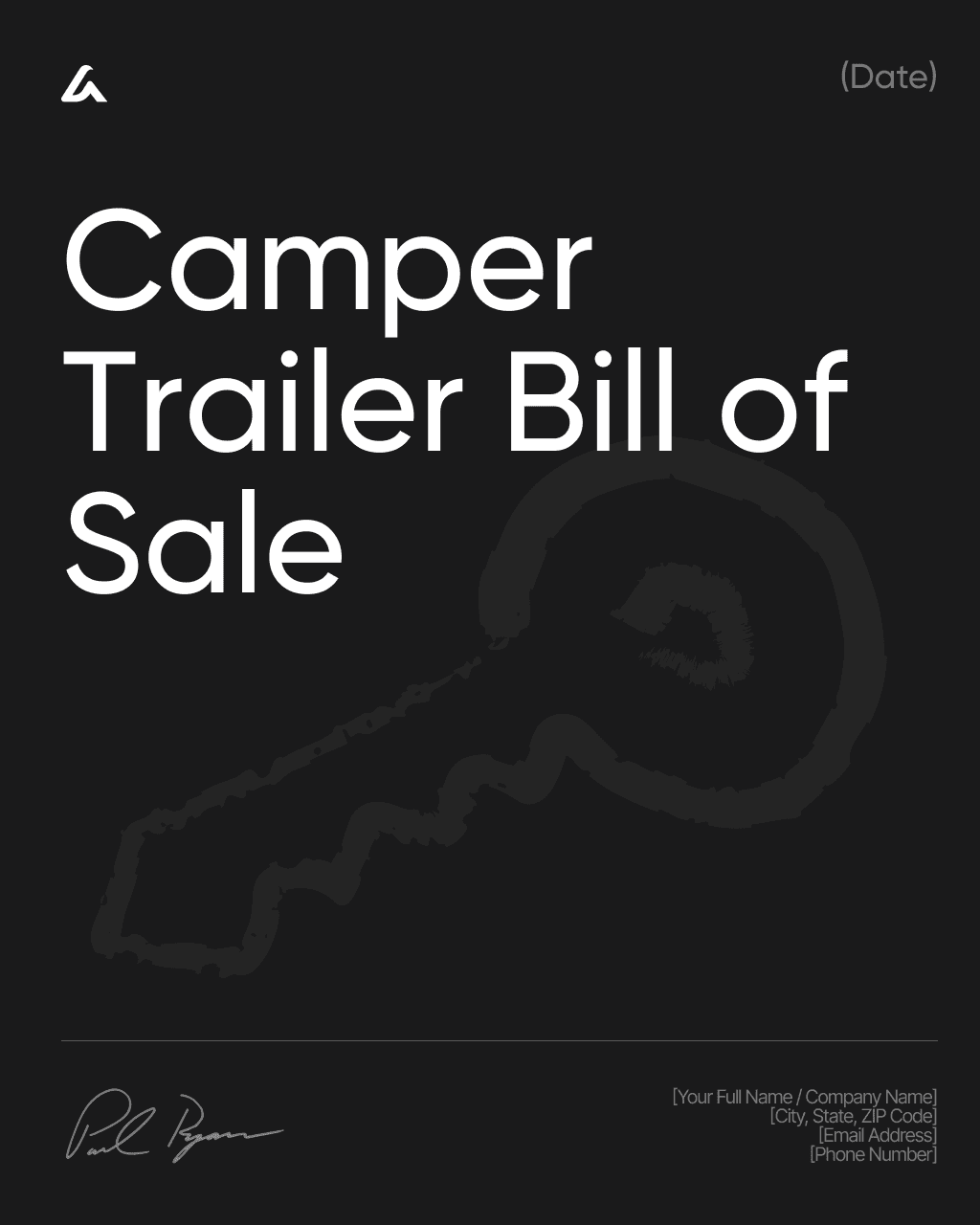
A Camper Trailer Bill of Sale is a legal document used to record the transfer of ownership of a camper trailer from a seller to a buyer. It is commonly used for transactions involving travel trailers, pop-up campers, teardrop trailers, or other towable recreational units. This document serves as proof of purchase and ownership and is often required for registration, title transfer, insurance, or financing purposes. The primary purpose of a camper trailer bill of sale is to clearly document the transaction details and protect both parties by establishing the terms of the transfer.
Using a standardized Camper Trailer Bill of Sale template ensures that all essential information is properly documented - including the identities of the buyer and seller, a detailed description of the camper trailer (make, model, year, vehicle or trailer identification number, and condition), the sale price, and the date of transfer. The template may also include disclosures about included accessories or equipment, “as-is” sale terms, warranty disclaimers, and statements regarding liens or encumbrances. AI-powered legal drafting tools like AI Lawyer help users generate jurisdiction-specific camper trailer bills of sale that align with local motor vehicle or trailer registration requirements. By guiding users through the necessary details and using clear legal language, the platform helps produce a professional, reliable document that supports a smooth ownership transfer and provides legal clarity for both buyer and seller.
Download Template: Camper Trailer Bill of Sale Template
For more information please refer to our article: Bill of Sale: Templates, Tips, and Key Terms for U.S. Sales
Or create your own document yourself with the help of AI.
1.14 Heavy Equipment Bill of Sale Template
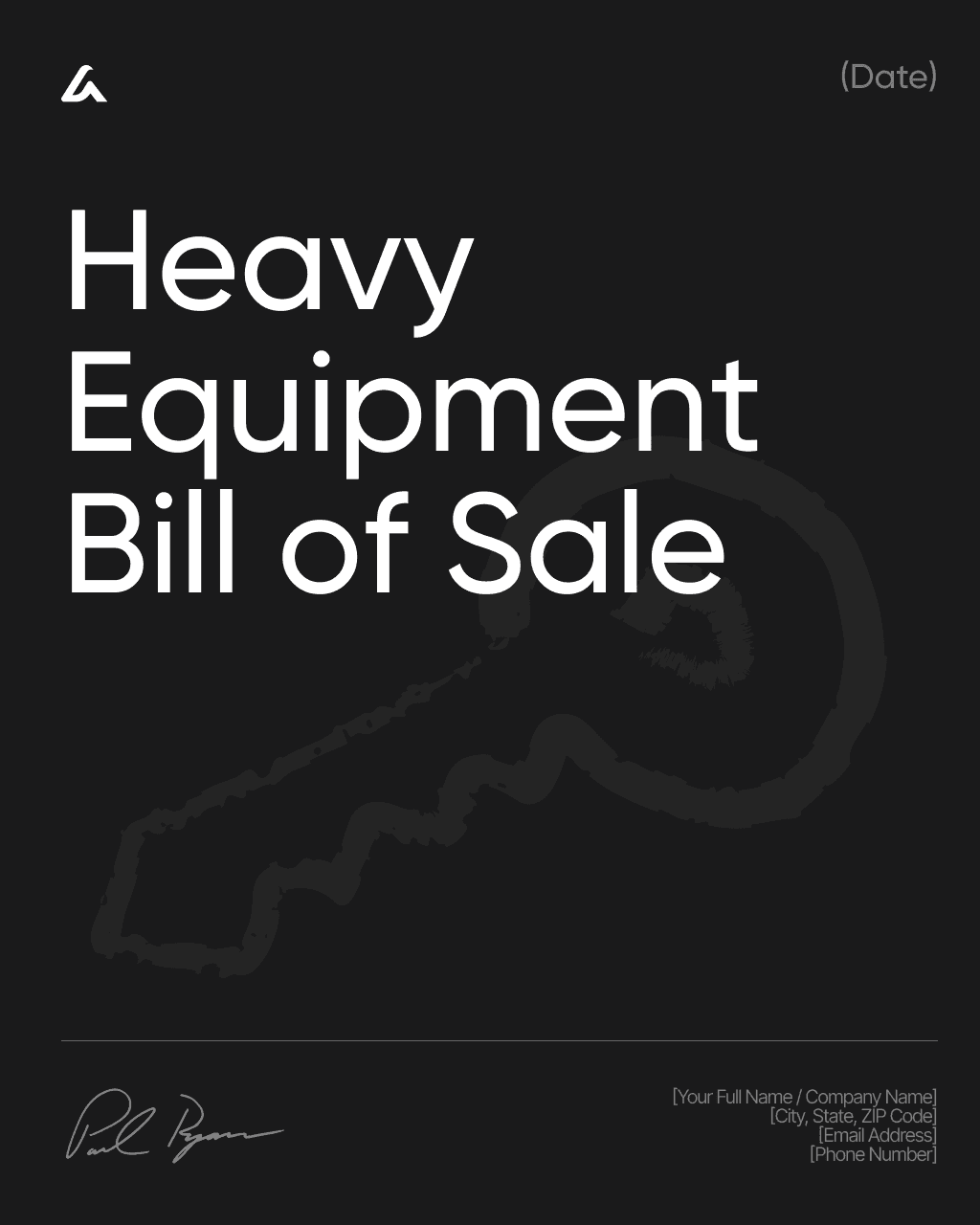
A Heavy Equipment Bill of Sale is a legal document used to record the transfer of ownership of large, industrial, or construction equipment from a seller to a buyer. It is commonly used for transactions involving machinery such as excavators, bulldozers, loaders, cranes, forklifts, and other heavy-duty equipment used in construction, mining, manufacturing, or agriculture. This document serves as proof of purchase and ownership and is often required for financing, insurance, tax reporting, or internal asset records. The primary purpose of a heavy equipment bill of sale is to clearly document the terms of the transaction and protect both parties from disputes related to ownership, condition, or payment.
Using a standardized Heavy Equipment Bill of Sale template ensures that all essential details are properly documented - including the names and contact information of the buyer and seller, a detailed description of the equipment (type, make, model, year, serial number, and condition), the purchase price, and the date of transfer. The template may also include “as-is” sale provisions, warranty disclaimers, statements confirming ownership free of liens, and terms regarding included attachments, maintenance records, or delivery. AI-powered legal drafting tools like AI Lawyer help users generate customized heavy equipment bills of sale tailored to specific industries and jurisdictions. By guiding users through the required information and applying clear legal language, the platform helps create a professional, reliable document that supports smooth ownership transfer, accurate record-keeping, and legal certainty for both buyer and seller.
Download Template: Heavy Equipment Bill of Sale Template
For more information please refer to our article: Bill of Sale: Templates, Tips, and Key Terms for U.S. Sales
Or create your own document yourself with the help of AI.
1.15 As-Is Bill of Sale Template
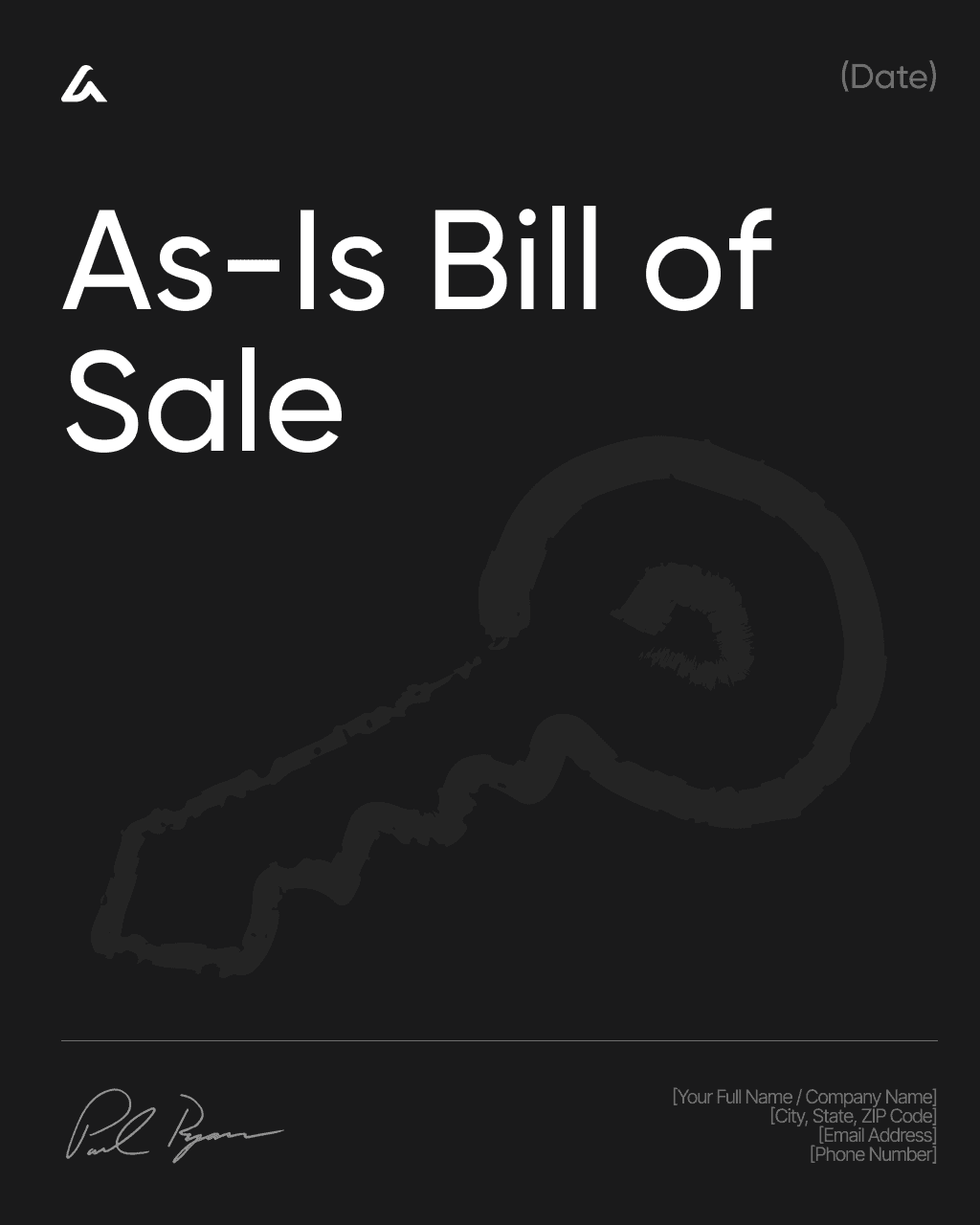
An As-Is Bill of Sale is a legal document used to record the transfer of ownership of goods or property where the buyer accepts the item in its current condition, with all known and unknown defects. It is commonly used in private sales of vehicles, equipment, personal property, or other assets when the seller does not provide any warranties or guarantees regarding condition or performance. The primary purpose of an as-is bill of sale is to clearly document that the buyer understands and agrees that the item is purchased without warranties, thereby limiting the seller’s liability after the sale.
Using a standardized As-Is Bill of Sale template ensures that all essential details are clearly documented - including the identities of the buyer and seller, a description of the item being sold, the sale price, and the date of transfer, along with explicit “as-is” language and warranty disclaimers. The template may also include statements confirming the seller’s right to sell the property, disclosure of known defects if required, and signatures of both parties. AI-powered legal drafting tools like AI Lawyer help users generate customized as-is bills of sale that comply with jurisdiction-specific requirements and clearly reflect the intent of the parties. By guiding users through the necessary information and applying precise legal language, the platform helps create a professional, reliable document that reduces disputes and provides clarity and protection for both buyer and seller.
Download Template: As-Is Bill of Sale Template
For more information please refer to our article: Bill of Sale: Templates, Tips, and Key Terms for U.S. Sales
Or create your own document yourself with the help of AI.
1.16 Bill of Sale for Business Assets Template
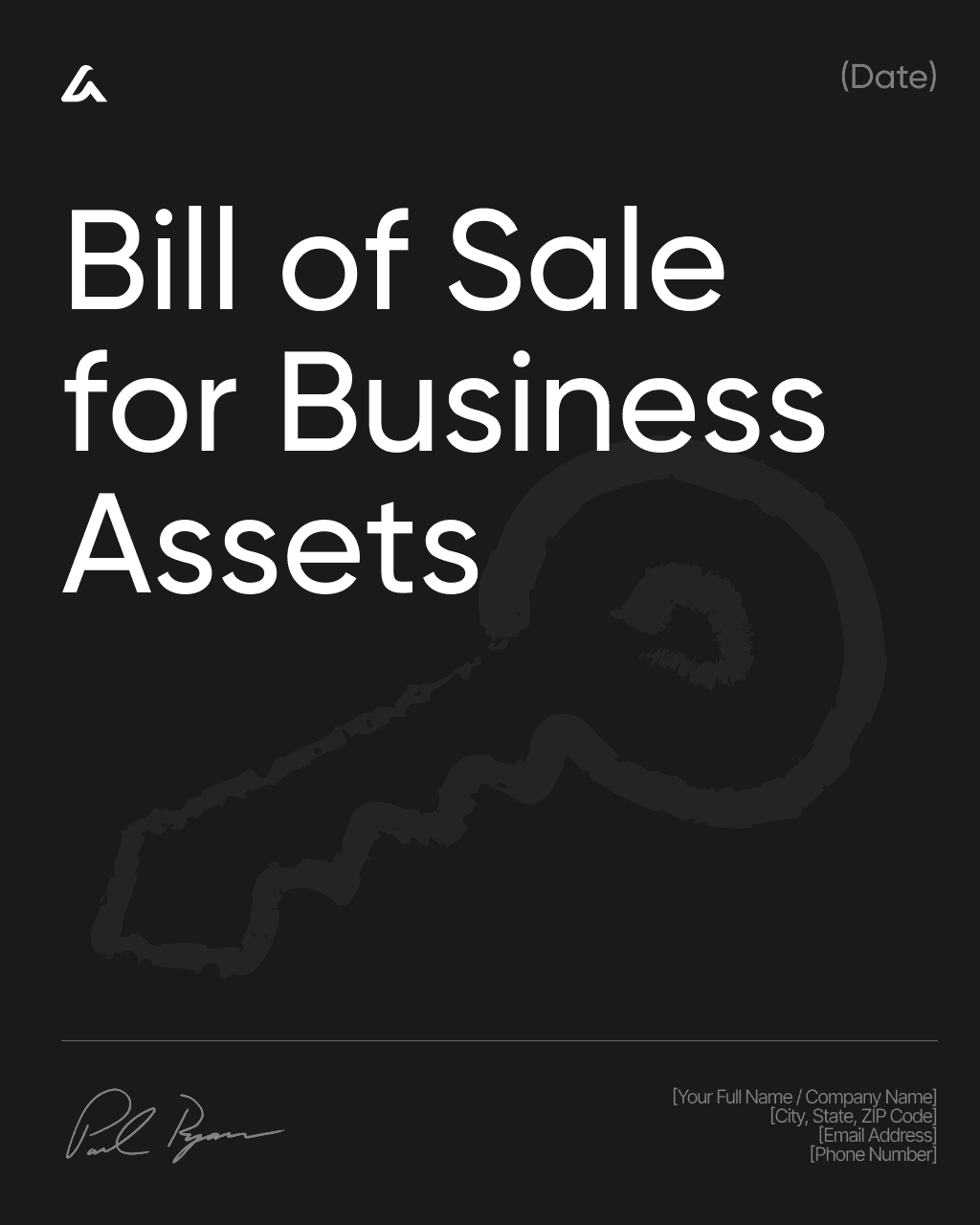
A Bill of Sale for Business Assets is a legal document used to formally record the sale and transfer of specific business assets from a seller to a buyer. It is commonly used in asset purchase transactions where ownership of tangible items, and sometimes certain intangible assets, changes hands. Typical assets covered can include equipment, inventory, furniture, fixtures, tools, vehicles, and other business property being conveyed as part of a sale. The primary purpose of this document is to provide clear written proof of what assets were transferred, when the transfer occurred, and under what consideration, helping both parties maintain clean records and reduce post-sale disputes.
Using a standardized Bill of Sale for Business Assets template helps ensure the transfer is documented in a clear and enforceable format, including identification of the buyer and seller, a detailed description or attached schedule of the assets, the purchase price or other consideration, and the effective date of transfer. The document often includes representations that the seller has authority to sell, and that the assets are transferred free of liens or encumbrances unless disclosed. It may also include “as-is” disclaimers, allocation of risk of loss, and signature requirements. AI-powered legal drafting tools like AI Lawyer help users generate customized bills of sale tailored to the transaction and jurisdiction, including properly structured asset descriptions and consistent legal terminology. By guiding users through key details and applying precise legal language, the platform helps create a professional bill of sale that supports clean asset transfer and reliable post-closing documentation.
Download Template: Bill of Sale for Business Assets Template
For more information please refer to our article: Business Sale and Purchase Agreement: Key Terms + Templates
Or create your own document yourself with the help of AI.
1.17 Nail Salon Bill of Sale Template
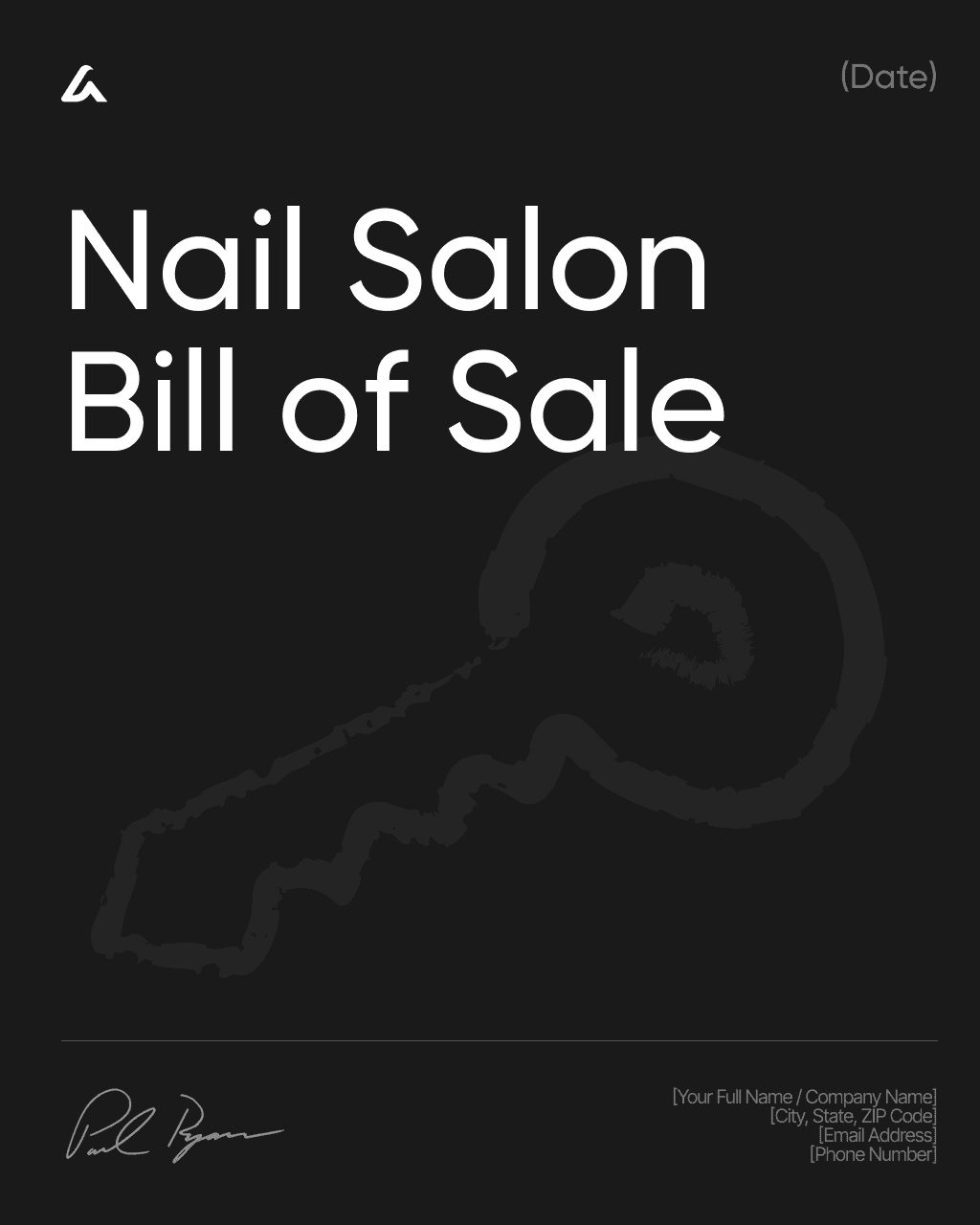
A Nail Salon Bill of Sale is a legal document used to record the sale and transfer of a nail salon’s business assets from a seller to a buyer. It is commonly used when a nail salon is sold through an asset sale rather than by transferring shares or membership interests. This document provides written proof of what property and transferable business items are included in the sale and confirms the date ownership changes hands. The primary purpose of a nail salon bill of sale is to clearly document the asset transfer and reduce disputes about what the buyer received.
Using a standardized Nail Salon Bill of Sale template helps ensure the document includes all essential details in a clear and enforceable format, such as the buyer and seller information, purchase price or consideration, and the effective date of transfer. It typically includes a detailed list of salon assets, such as manicure tables, pedicure chairs, UV/LED lamps, tools and equipment, furniture, fixtures, inventory and supplies, signage, phone number, website or domain assets, and certain intangible assets like goodwill. The bill of sale often includes “as-is” language, statements about liens or encumbrances, and signature blocks. AI-powered legal drafting tools like AI Lawyer help users generate customized nail salon bills of sale tailored to the transaction and jurisdiction, including properly formatted asset schedules and consistent legal language. By guiding users through key deal details, the platform helps create a professional bill of sale that supports a smooth handover of salon assets and clean ownership records.
Download Template: Nail Salon Bill of Sale Template
For more information please refer to our article: Business Sale and Purchase Agreement: Key Terms + Templates
Or create your own document yourself with the help of AI.
1.18 Restaurant Bill of Sale Template
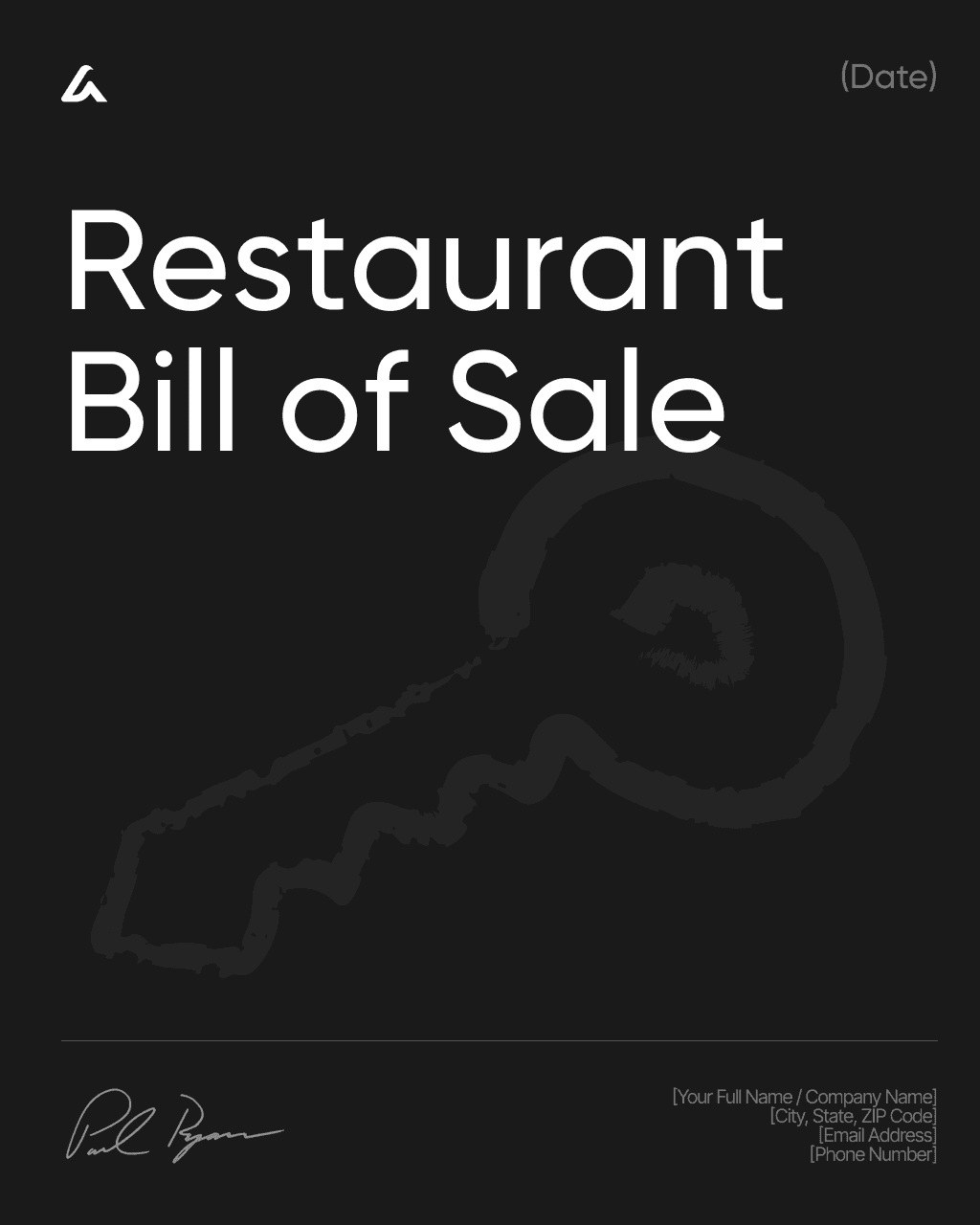
A Restaurant Bill of Sale is a legal document used to record the sale and transfer of a restaurant’s business assets from a seller to a buyer. It is commonly used when a restaurant is sold as an asset transaction, confirming what equipment, inventory, and transferable business property are included and when ownership passes to the buyer. This document often supports a broader purchase agreement, but it serves as the key proof of the asset transfer itself. The primary purpose of a restaurant bill of sale is to clearly document what was sold and help prevent disputes after closing.
Using a standardized Restaurant Bill of Sale template helps ensure all essential details are included in a clear and enforceable format, including identification of the buyer and seller, the purchase price or other consideration, and the effective transfer date. It typically includes a detailed asset list or schedule covering kitchen equipment, appliances, furniture, fixtures, smallwares, inventory, POS systems, signage, and business-related items like phone numbers, websites or domain assets, and goodwill. The bill of sale often includes “as-is” language, seller assurances about ownership and liens, and signatures. Depending on the transaction, it may reference separate assignments of leases, vendor contracts, and permits or licenses where transferable. AI-powered legal drafting tools like AI Lawyer help users generate customized restaurant bills of sale tailored to the deal structure and jurisdiction, producing a professional document that supports clean asset transfer, reliable records, and a smooth operational handover.
Download Template: Restaurant Bill of Sale Template
For more information please refer to our article: Business Sale and Purchase Agreement: Key Terms + Templates
Or create your own document yourself with the help of AI.
1.19 Artwork Bill of Sale Template
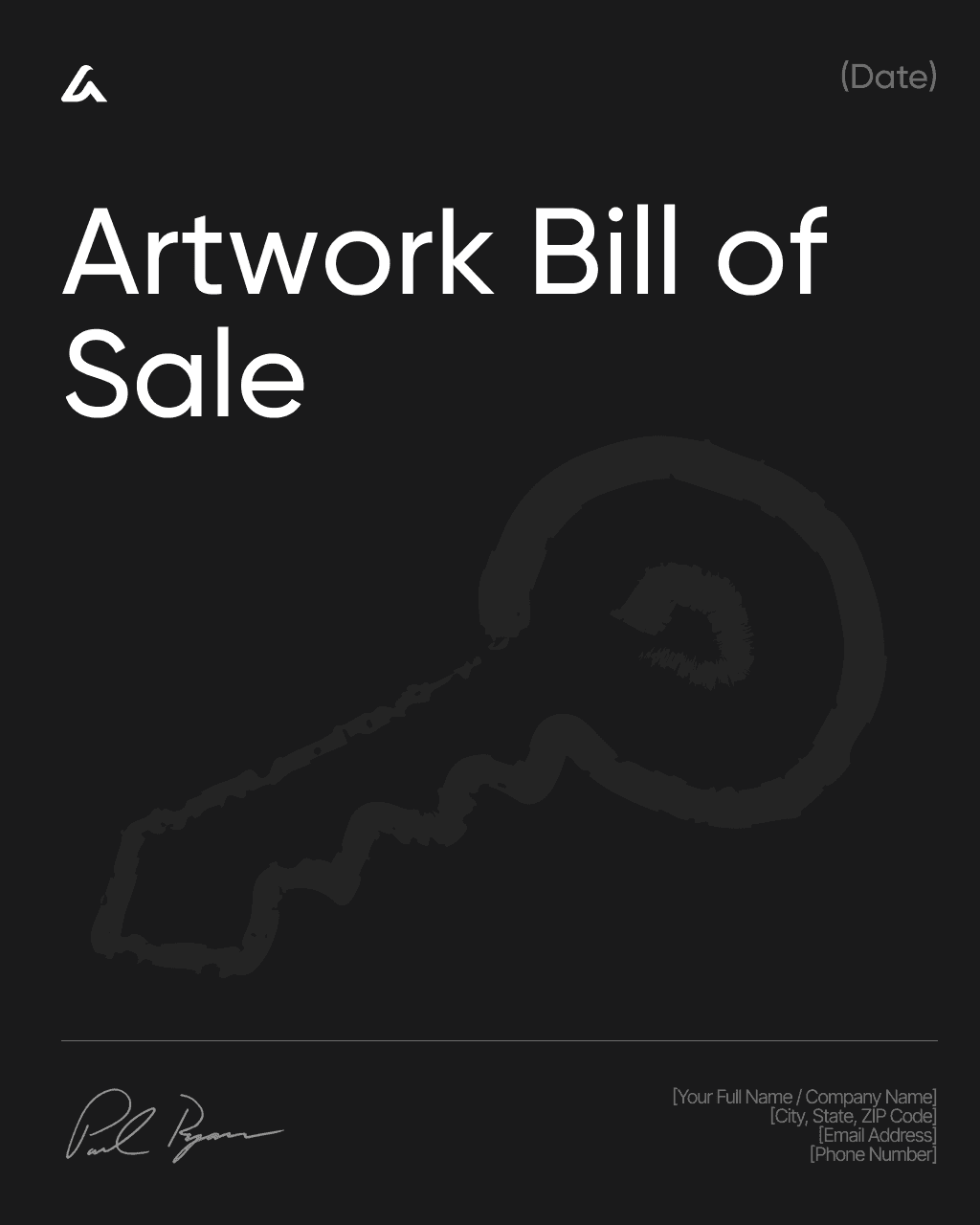
An Artwork Bill of Sale Template documents the transfer of ownership of an artwork from a seller to a buyer in a clear, dated written record. It is commonly used for sales of paintings, prints, sculptures, photography, and other visual art between individuals, galleries, dealers, or collectors, including private sales and online transactions. The document typically identifies the parties, describes the artwork in detail, and confirms the purchase price and payment terms, helping both sides memorialize what was sold and under what conditions. Its purpose is to create reliable proof of title transfer and reduce disputes about authenticity, condition, or the scope of what was included in the sale.
This template often includes artist and work details such as title, medium, dimensions, year, edition number, and any certificate of authenticity or provenance information being provided. It may address delivery terms, risk of loss during shipment, and whether the sale is final or subject to inspection, along with acknowledgments about the artwork’s condition at the time of transfer. Many bills of sale also clarify what rights are not transferred, such as copyright, reproduction rights, or moral rights where applicable, unless expressly assigned in a separate written agreement. The template can include seller representations regarding ownership and authority to sell, as well as disclaimers or limited warranties tailored to the transaction, providing a practical record for insurance, tax, and collection management purposes.
Download Template: Artwork Bill of Sale Template
For more information please refer to our article:
Or create your own document yourself with the help of AI.
1.20 Affidavit of Vehicle Ownership Template
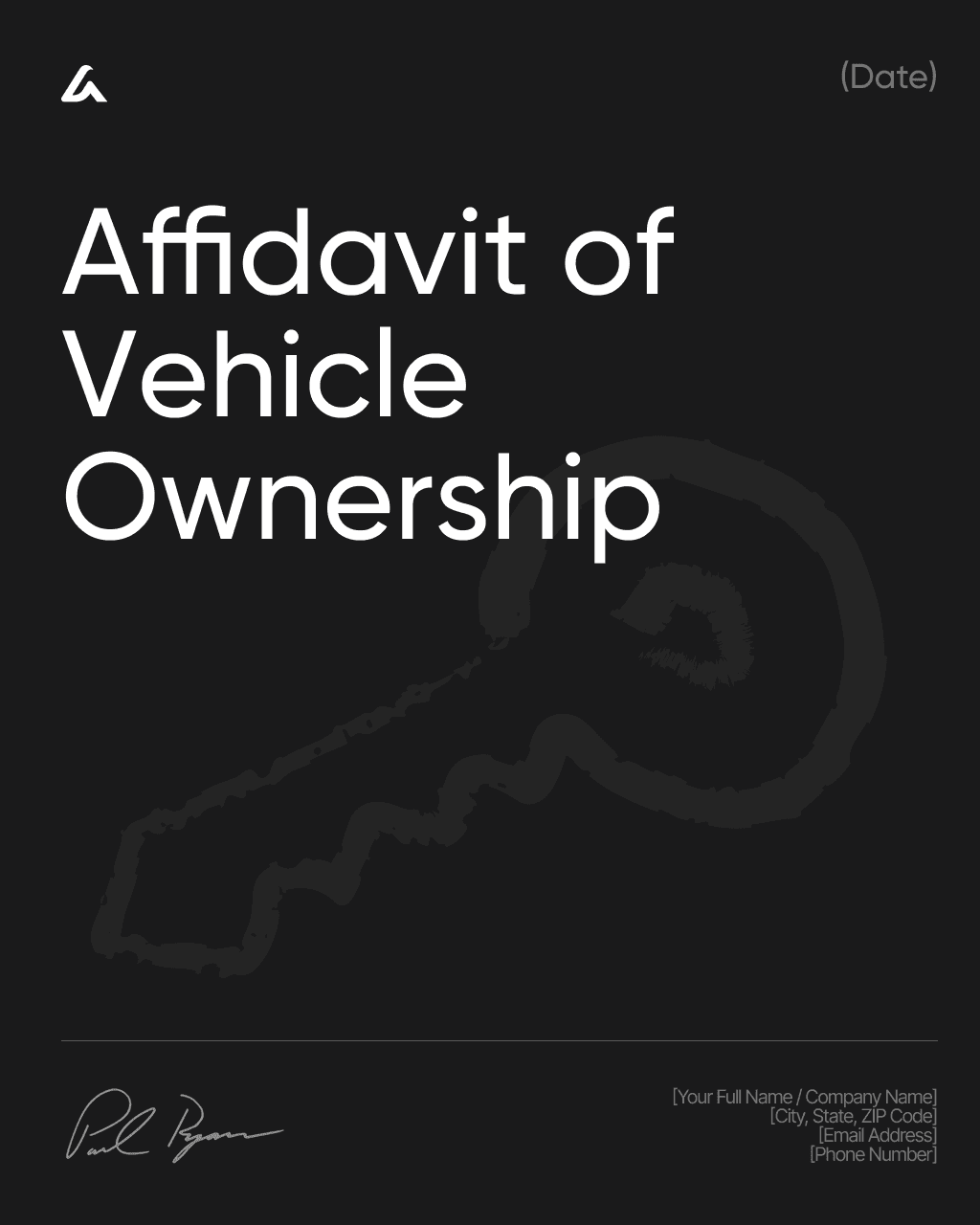
An Affidavit of Vehicle Ownership Template is a sworn statement used to confirm a person’s ownership interest in a vehicle when standard title documentation is missing, incorrect, or otherwise unavailable. It is commonly used for DMV title and registration issues, lost title situations, estate transfers, bonded title applications, or disputes where an agency or insurer requests a formal declaration of ownership. The affidavit typically identifies the vehicle by VIN, make, model, and year, and states how the affiant acquired the vehicle and why the title record needs clarification. Its purpose is to provide a clear, notarized record that supports administrative processing and helps establish an ownership claim based on the affiant’s knowledge and supporting evidence.
This template usually includes the vehicle description, purchase or transfer details, dates, seller information if known, odometer reading where relevant, and a statement that there are no undisclosed liens or that liens are disclosed as applicable. It often includes attachments such as a bill of sale, registration records, insurance documents, probate papers, or lien release letters to corroborate the ownership statement. Many affidavits include a declaration under penalty of perjury and notarization requirements, reflecting that false statements can carry legal consequences. Because DMV rules vary by jurisdiction and situation, the template is designed to be adaptable while remaining factual and specific. Clear ownership affidavits help reduce processing delays and support consistent records when resolving title issues.
Download Template: Affidavit of Vehicle Ownership Template
For more information please refer to our article:
Or create your own document yourself with the help of AI.
📘 Overview: Which Type of Bill of Sale Should You Use?
Not sure which bill of sale fits your situation - vehicle, general, or warranty? Each document type serves a specific legal and practical purpose, depending on the nature of the property, the level of risk involved, and whether ownership guarantees are provided. Choosing the correct form ensures your sale is properly recorded, ownership is transferred without dispute, and both parties remain legally protected.
A Vehicle Bill of Sale is the most formal and regulated version, required or recommended for automobiles and other titled assets. A General Bill of Sale offers flexibility for everyday personal property transfers, while a Warranty Bill of Sale adds stronger legal assurances of ownership and freedom from liens. Understanding these distinctions helps you select the most suitable document for your transaction - ensuring it is valid, enforceable, and compliant with jurisdictional rules.
Document Type | Validity & Use Case | Key Requirements / Legal Notes |
|---|---|---|
Recognized in all jurisdictions for the sale of cars, motorcycles, boats, and other titled vehicles. Often required to register and transfer ownership. | Must include VIN, make, model, year, odometer reading, purchase price, date, and signatures. Some states require notarization. Does not replace title transfer but supports registration and protects both parties. | |
Used for most private sales of personal property — electronics, furniture, tools, collectibles, and equipment. Optional but strongly recommended for proof of ownership. | Includes buyer/seller info, item description, price, and date. May contain “as-is” or limited warranty clauses. Valid with signatures; no notarization required unless specified. Functions as a simple proof-of-sale record. | |
Common for higher-value assets or business equipment where clear title and ownership guarantees are essential. Adds legal warranty protection. | Contains standard sale details plus seller’s warranty that the property is free from liens or claims. Creates legal accountability for ownership disputes. May require notarization for enforceability. | |
Used for private car sales to document the transaction and support title transfer, registration, and insurance updates. Often requested by DMVs or insurers as proof of purchase. | Should include buyer/seller details, VIN, make/model/year, purchase price, date, odometer reading where applicable, and signatures. May require notarization in some jurisdictions. Does not replace title transfer but supports it. | |
Used to transfer ownership of a boat and support registration, title transfer, marina records, and insurance. Often required by state boating agencies. | Should include vessel details (make/model/year, HIN, registration number), sale price, date, included equipment (motor/trailer), and signatures. Some jurisdictions require notarization or witness signatures. | |
Used for motorcycle ownership transfer and commonly needed for title transfer, registration, and proof of purchase. | Should include buyer/seller info, VIN, make/model/year, mileage, price, date, and signatures. May include lien statement and “as-is” clause. Notarization may be required in some states. | |
Used to transfer ownership of a mobile/manufactured home, often for title updates, park approvals, tax records, or registration depending on whether it is treated as personal or real property. | Should include make/model/year, size, serial/VIN, location, sale price, date, lien status, and signatures. May require notarization and additional title or assignment forms depending on jurisdiction. | |
Used to document sale of business, industrial, agricultural, or office equipment for accounting, tax, insurance, and proof-of-ownership purposes. | Should include detailed equipment description (type, make/model, serial number, condition), price, date, and signatures. Often includes “as-is” and lien-free ownership language. | |
Used for general private sales of movable personal property like electronics, tools, appliances, or collectibles. Helps prove ownership and payment. | Should include buyer/seller info, item description, price, date, and signatures. Can include “as-is” clause and warranty disclaimer. Typically notarization is optional unless required locally. | |
Used when transferring a vehicle as a gift to document the ownership change and support title/registration updates and tax or fee exemptions where available. | Should include vehicle details (VIN, make/model/year, mileage), date of transfer, statement that it is a gift, and signatures. Some jurisdictions require additional gift affidavits or tax declarations. | |
Used to transfer ownership of a tractor for farm/commercial use and support financing, insurance, and asset records. | Should include tractor identifiers (make/model/year, serial number), condition, included attachments, price, date, and signatures. Often includes “as-is” and lien-free statement. | |
Used for private sale of furniture, including high-value or antique items, to document payment and ownership transfer. | Should include itemized description (type, quantity, condition, identifying features), price, date, and signatures. “As-is” language is common; warranties are usually disclaimed. | |
Used to transfer ownership of a camper/travel trailer and support registration, title transfer, and insurance. | Should include trailer details (make/model/year, trailer/VIN, condition), sale price, date, and signatures. May require notarization. Often lists included accessories and “as-is” terms. | |
Used for sale of large construction/industrial machinery and supports financing, insurance, tax reporting, and asset transfer records. | Should include equipment details (type, make/model/year, serial number, hours/usage if relevant), price, date, and signatures. Typically includes “as-is,” lien-free ownership, and delivery terms. | |
Used for any sale where the buyer accepts the item in its current condition without warranties. Common for used vehicles, equipment, and private-party sales. | Must clearly state “as-is” and warranty disclaimer language, plus buyer/seller info, item description, price, date, and signatures. May still require separate title/registration paperwork for vehicles. | |
Used to transfer ownership of business-related assets as part of an asset sale or business transaction. Commonly used for selling equipment, inventory, furniture, fixtures, tools, or other tangible business property, and to support accounting, tax reporting, and asset transfer records. | Should include buyer and seller information, detailed description or attached schedule of business assets, purchase price or consideration, transfer date, representations of ownership, lien-free or disclosed encumbrance language, “as-is” clause (if applicable), and signatures. May reference related purchase agreements and delivery terms. | |
Used to transfer ownership of nail salon business assets as part of an asset sale. Commonly supports salon takeovers, relocations, or business exits, and helps document what physical and transferable assets are included in the transaction. | Should include buyer and seller details; effective transfer date; purchase price; detailed list of salon assets (manicure tables, pedicure chairs, equipment, furniture, inventory, signage); “as-is” sale language; lien or encumbrance disclosures; signatures. | |
Used to transfer ownership of restaurant business assets in an asset purchase transaction and support clean operational handover. Common in restaurant sales where licenses or leases are handled separately. | Should include buyer and seller information; asset list (kitchen equipment, appliances, furniture, fixtures, inventory, POS systems); price and transfer date; ownership and lien representations; “as-is” terms; signatures. May reference related lease or contract assignments. | |
Used to document the sale and transfer of ownership of an artwork (paintings, prints, sculptures, photography) between private parties, galleries, or dealers. Helps support provenance, insurance, and resale records. | Should include detailed artwork description (artist, title, medium, dimensions, year, edition/serial), purchase price, date, and signatures. Typically transfers title only, not copyright or reproduction rights unless expressly stated. | |
Used to confirm vehicle ownership when a title is missing, incorrect, or unavailable (e.g., lost title, estate transfer, bonded title). | Should include VIN and vehicle details, acquisition basis, and lien disclosures; typically signed under penalty of perjury and may require notarization; requirements vary by DMV/state. |
2. State-Specific Requirements for Bills of Sale in the USA
Bills of Sale document the transfer of ownership for vehicles, boats, and other personal property. While federal law doesn’t regulate their format, each U.S. state defines when a Bill of Sale is required, recommended, or optional. These differences matter for registration, taxation, and proof of ownership.
Below we review the four main regions — West Coast, Northeast, South, and Midwest — focusing on states most often searched by users: California, Washington, New York, Texas, Florida, and Illinois. Each section highlights key documents, legal nuances, common mistakes, search trends, and how AI Lawyer helps create state-compliant Bills of Sale.
2.1 West Coast: California and Washington
California: official DMV forms and transfer rules
Actual Documents: Vehicle Bill of Sale (Form REG 135), Vessel Bill of Sale, Notice of Transfer and Release of Liability.
Requirements and nuances: California does not always require a Bill of Sale for vehicles — a properly signed title usually suffices — but the California DMV provides an official Form REG 135 for situations where additional proof is needed. A Vehicle Bill of Sale — California records essential details of the transaction, including VIN, odometer reading, sale price, and party information, serving as legal evidence of ownership transfer recognized by the DMV.
A Bill of Sale becomes mandatory if the seller’s name differs from the name on the title or when selling a boat (vessel). The seller must also file a Notice of Transfer and Release of Liability within five days to report the sale.
Even when optional, a written Bill of Sale protects both parties and helps calculate use tax.
Common Searches:
“California DMV Bill of Sale form”
“Do I need a Bill of Sale to sell my car in California?”
Common Mistakes: Failing to file the Notice of Transfer; leaving off buyer/seller signatures; or forgetting the sale date and amount.
How AI Lawyer helps: AI Lawyer provides California-specific templates that include REG 135 wording, auto-fills seller/buyer fields, and attaches the Notice of Transfer. It also reminds users to submit the notice within five days to the DMV.
Washington: mandatory for boats, electronic filing options
Actual Documents: Vehicle Bill of Sale (Form TD-420-065), Vessel Bill of Sale, Report of Sale.
Requirements and nuances: The Washington State Department of Licensing (DOL) requires a Bill of Sale for boat (vessel) transfers and recommends it for vehicles. A Vehicle Bill of Sale — Washington documents the change of ownership, confirming VIN, sale amount, and date, and is accepted by the DOL as proof of lawful transfer for both vehicles and vessels.
The DOL offers Form TD-420-065 and lets sellers report sales online through the Report of Sale service within 5 days.
Washington law (RCW 46.12.650) makes this report crucial — it releases the seller from liability for tolls or accidents after sale.
Common Searches:
“Washington vehicle Bill of Sale form”
“How to report a sold car in Washington”
Common Mistakes: Not filing the Report of Sale on time; using incomplete forms without VIN or price; or missing witness/notary where required for boats.
How AI Lawyer helps: AI Lawyer creates Washington-ready templates with the DOL format, provides the Report-of-Sale link, and ensures the Bill of Sale includes all required data fields (VIN, date, signatures, and sale price).
2.2 Northeast: New York
New York: mandatory for registration and tax
Actual Documents: Vehicle Bill of Sale (Form MV-912), Sales Tax Statement (DTF-802), Gift Affidavit (optional).
Requirements and nuances: In New York, a Bill of Sale is required to register privately purchased vehicles. A Vehicle Bill of Sale — New York confirms the legal transfer of ownership, providing the DMV with verified sale details—buyer, seller, VIN, and amount—to support registration and sales-tax calculation. The NY DMV Form MV-912 records the buyer, seller, VIN, and price. The DMV uses it to calculate sales tax along with Form DTF-802.
The DMV warns buyers to verify the seller’s ID and match names on the title and Bill of Sale to prevent fraud (NY DMV Consumer Protection).
Common Searches:
“New York Bill of Sale MV-912”
“Do I need a Bill of Sale to register my car in NY?”
Common Mistakes: Failing to include the correct purchase price; using generic receipts instead of the official MV-912; or skipping the DTF-802 tax form.
How AI Lawyer helps: AI Lawyer provides the official DMV templates (MV-912 + DTF-802), calculates sales tax automatically, and ensures both documents are correctly filled for NY registration.
2.3 Southern States: Texas and Florida
Texas: optional for cars, required for boats and livestock
Actual Documents: Vehicle Bill of Sale, Boat Bill of Sale, Livestock Bill of Sale.
Requirements and nuances: The Texas DMV does not require a Bill of Sale for standard vehicle sales if the title is signed, but it’s strongly recommended as proof of payment. A Vehicle Bill of Sale — Texas documents the transaction details—VIN, buyer and seller information, date, and price—serving as vital proof of ownership transfer recognized by the DMV and other agencies.
For boats, the Texas Parks & Wildlife Department mandates a Bill of Sale for registration.
For livestock, written Bills of Sale are required under Texas Agricultural Code § 146 to deter theft.
Sellers should also submit a Vehicle Transfer Notification within 30 days to avoid liability.
Common Searches:
“Texas vehicle Bill of Sale required?”
“Boat Bill of Sale Texas form”
Common Mistakes: Assuming the title alone is enough for boats or livestock; forgetting to file the transfer notice; or not including full buyer details.
How AI Lawyer helps: AI Lawyer generates Texas-specific forms (vehicle, boat, livestock), inserts state code references, and automatically reminds users to submit the 30-day transfer notification to the DMV.
Florida: notarization and proof of sale
Actual Documents: Notice of Sale / Bill of Sale (Form HSMV 82050), Vessel Bill of Sale.
Requirements and nuances: While not strictly required by statute, the Florida Highway Safety and Motor Vehicles (FLHSMV) strongly encourages using a notarized Bill of Sale. A Vehicle Bill of Sale — Florida serves as both proof of payment and a liability release, and when notarized, it meets FLHSMV standards for official recognition in title and registration records.
Form HSMV 82050 serves both as a notice of sale and liability release.
For boats, a notarized Bill of Sale is necessary to register ownership (UpCounsel Florida Guide).
Common Searches:
“Florida Bill of Sale form 82050”
“Do I need to notarize a Bill of Sale in Florida?”
Common Mistakes: Notarizing only one signature; failing to send the notice to FLHSMV; omitting the sale date and VIN.
How AI Lawyer helps: AI Lawyer provides Florida’s dual-purpose form, includes notary certificate language, and alerts sellers to file the notice promptly with FLHSMV to release liability.
2.4 Midwest: Illinois
Illinois: notarization optional but thorough records required
Actual Documents: Vehicle Bill of Sale, Boat Bill of Sale, Tax Form RUT-50.
Requirements and nuances: Illinois does not legally require a Bill of Sale for vehicles, but it’s necessary to complete the RUT-50 Use Tax Form when registering a private-party purchase. A Vehicle Bill of Sale — Illinois documents the buyer, seller, VIN, and purchase price, ensuring accurate tax reporting and protecting both parties during private transactions or DNR boat registrations.
A written Bill of Sale provides proof of purchase price, helping calculate the tax owed.
For boat sales, a Bill of Sale is required for registration with the Illinois DNR.
Common Searches:
“Illinois vehicle Bill of Sale form”
“RUT-50 tax requirements private car sale”
Common Mistakes: Not including price details (leading to tax estimation by the state); using verbal agreements; or skipping signatures.
How AI Lawyer helps: AI Lawyer integrates Illinois tax-form prompts, adds optional notary acknowledgment, and ensures the Bill of Sale meets DNR and Secretary-of-State expectations for vehicles and boats.
Summary
State requirements for Bills of Sale vary widely. California, New York, and Washington provide official forms; Texas and Florida emphasize notarization or liability release; Illinois uses the Bill of Sale to support tax filings.
AI Lawyer adapts each template to state regulations — adding DMV or tax-form links, verifying required fields, and prompting users to file transfer notices.
This ensures every sale, from a used car in Texas to a boat in Florida, is properly documented, enforceable, and compliant with local law.
3. 2024–2025 Developments: Digital Signatures, e-Titling & Verification
The period of 2024–2025 has brought notable advancements in how ownership transfers are documented and secured, including the use of digital technology and new legal frameworks. Bills of sale, like many legal documents, are evolving beyond pen-and-paper towards electronic forms. Below are some key developments and trends:
3.1 📍 Blockchain-Based Asset Transfers
Blockchain technology is revolutionizing how ownership of physical assets is recorded, verified, and transferred — potentially transforming or even replacing traditional bills of sale and paper titles. As a secure, decentralized ledger, blockchain allows transaction data to be stored immutably, making it almost impossible to forge or alter records. This transparency and permanence are particularly valuable for vehicle ownership, where fraud and paperwork delays have long plagued the system.
In 2023, California’s Department of Motor Vehicles made headlines by piloting a blockchain-based car title system using a private fork of the Tezos blockchain. The initiative aims to digitize millions of vehicle titles and enable digital car title NFTs, allowing owners to transfer vehicles through smart contracts rather than paper forms. The DMV’s digital chief described a future where consumers could “sell” cars by transferring a digital token, instantly updating ownership records and eliminating manual filings. Similar pilots have emerged in states like Vermont and Colorado, and startups such as ChampTitles are building full blockchain-based registration systems to modernize DMV infrastructure nationwide. These projects promise to reduce fraud, enhance transparency, and dramatically speed up transfers — shifting bills of sale from static documents into automated, verifiable blockchain transactions.
📜 Read full analysis →
✨ Create a blockchain-enabled vehicle bill of sale →
🚀 Generate your own document with AI →
3.2 📍 Online Notarization of Bills of Sale
Remote Online Notarization (RON) has rapidly become one of the most transformative innovations in document execution, especially for high-value transactions like vehicle, vessel, or equipment sales. Traditionally, notarization required an in-person meeting to verify identities and witness signatures — a process that was often time-consuming and location-dependent. As of January 1, 2024, however, 44 U.S. states have enacted RON laws, allowing notaries to perform their duties remotely via live video calls. During the session, signers verify their identities through government ID checks and knowledge-based authentication, while the notary records and digitally seals the document. The result is a tamper-evident, audit-tracked e-notarized bill of sale that carries the same legal weight as its paper counterpart.
The benefits for buyers and sellers are substantial. Remote notarization allows parties in different cities or even states to finalize sales within minutes — no need for travel or mailing documents. For example, a Florida boat seller can complete a notarized bill of sale with a buyer hundreds of miles away through a secure online portal. The process also enhances fraud protection, since digital notarization systems log session recordings, timestamps, and certificate IDs that can later be verified in court. As e-signatures and electronic filings become standard under the U.S. ESIGN Act and Uniform Electronic Transactions Act (UETA), RON is expected to become universal across all 50 states by 2025 — setting a new norm where even private sales can be safely executed end-to-end online.
📜 Read full analysis →
✨ Create an online-notarized bill of sale →
🚀 Generate your own document with AI →
3.3 📍 Trends in Private-Party Auto Sales & Fraud Prevention
Private-party auto sales have surged through platforms like Facebook Marketplace, Craigslist, and eBay Motors, offering convenience but also attracting sophisticated scams. According to recent reports, online car-buying scams increased by roughly 30% in 2023, with fraudsters posting fake listings or selling stolen vehicles using forged titles. The Better Business Bureau and state DMVs have repeatedly warned buyers to beware of offers that seem “too good to be true,” particularly when sellers demand remote payments or refuse in-person inspections. In late 2024, the New York DMV issued an official alert after hundreds of stolen cars were sold online using falsified VINs and titles, urging the public to verify ownership, inspect paperwork carefully, and complete transactions in police-designated “safe zones” under surveillance. These areas — often located in police station parking lots — have proven effective in preventing thefts and scams tied to online marketplaces.
Authorities and consumer advocates recommend a few key safeguards: always verify the seller’s ID and title, match VINs on the car and documents, use tools like NICB VINCheck to confirm the vehicle’s history, and insist on a written bill of sale signed by both parties. Buyers are also advised to exchange payment in traceable ways (e.g., cashier’s checks) and meet only in secure, public areas. Meanwhile, platforms like eBay Motors and TRED are introducing built-in escrow and title verification systems to make peer-to-peer sales safer. As online vehicle transactions continue to rise, regulators and tech firms alike are focusing on stronger anti-fraud mechanisms, blending traditional verification with digital solutions like escrow, blockchain titles, and automated lien checks.
📜 Read full analysis →
✨ Create a fraud-safe vehicle bill of sale →
🚀 Generate your own document with AI →
3.4 📍 Rise of Peer-to-Peer Marketplaces & Consumer Protection
Peer-to-peer vehicle sales are reaching record highs as platforms like Facebook Marketplace, CarGurus, and AutoTrader streamline the process of listing and buying used cars directly from individuals. However, this convenience has also led to a rise in identity theft and title fraud, prompting states and online marketplaces to adopt stricter verification systems. In 2024, several states, including Florida and New York, began requiring online vehicle listings to include VIN verification or proof of title authenticity before posting. Some marketplaces have followed suit, introducing automated fraud filters that flag mismatched VINs or suspiciously low prices.
In response, tech-driven escrow and verification platforms are becoming essential tools for private sellers and buyers. Services like TRED and Escrow.com now handle secure payments, confirm lien releases, and cross-check titles with state databases before finalizing the transaction. These platforms are also exploring blockchain-based title verification, which could soon provide real-time, tamper-proof proof of ownership. As regulators strengthen consumer protection laws, and technology automates verification and payment steps, private car sales are steadily transitioning toward a safer, digitally certified ecosystem.
📜 Read full analysis →
✨ Create a verified peer-to-peer vehicle sale agreement →
🚀 Generate your own document with AI →
3.5 📍 Law Enforcement Collaboration & Safe Exchange Zones
Law enforcement agencies across the U.S. are increasingly partnering with municipalities and online platforms to combat scams in private-party sales. Following a surge in online vehicle theft and fraud, states like New York, Texas, and Illinois have expanded their “Safe Exchange Zones” programs — designated, camera-monitored areas where individuals can meet to finalize private sales securely. The New York DMV reported that hundreds of stolen vehicles were recovered after scammers attempted to sell them online using falsified titles, prompting new public awareness campaigns encouraging in-person verification at police-monitored sites.
These zones, typically located in police station parking lots or municipal lots with 24/7 surveillance, are helping reduce incidents of fraud, robbery, and theft. Many police departments also now publish online safety checklists and VIN verification resources for residents engaging in peer-to-peer sales. As these initiatives spread nationally, they are becoming a standard recommendation from DMVs and consumer protection offices — blending digital convenience with physical security to protect buyers and sellers alike.
📜 Read full analysis →
✨ Create a secure vehicle bill of sale for safe-zone exchanges →
🚀 Generate your own document with AI →
3.6 📍 Growing Role of Verification Technology in Private Sales
The private auto market is seeing a surge in digital verification technologies designed to authenticate vehicles, titles, and participants in real time. Startups and major marketplaces are integrating tools that verify VINs against national databases, detect photo reuse across listings, and use AI to identify fraudulent ads. For example, the National Insurance Crime Bureau (NICB) has launched enhanced VINCheck tools that instantly alert users to stolen or salvage-titled vehicles. Meanwhile, companies like AutoCheck and Carfax are expanding partnerships with DMV systems to provide live title status updates during transactions.
This convergence of verification, AI, and database integration is gradually transforming how private auto sales are conducted. Buyers can now scan a QR code from a bill of sale or title and instantly confirm its legitimacy, while sellers can protect their listings through verified identity systems. Within a few years, experts expect that digital verification will be embedded directly into marketplace apps, ensuring that every transaction includes real-time proof of identity, title, and payment security — effectively minimizing the room for scams.
📜 Read full analysis →
✨ Create a verified digital bill of sale with AI →
🚀 Generate your own document with AI →
4. Conclusion: Using AI Templates to Streamline and Secure Personal Property Transfers
Transferring ownership of property — whether it’s a car, a piece of equipment, or any valuable item — has traditionally required time-consuming paperwork and manual verification. Today, however, digital transformation and Artificial Intelligence are redefining this process. AI-powered document tools can instantly generate customized, legally compliant Bills of Sale tailored to the type of asset being transferred. By incorporating jurisdiction-specific requirements directly into the drafting process, these intelligent systems eliminate common errors such as missing signatures, incomplete clauses, or incorrect descriptions. Users simply provide the basic transaction details, and the AI outputs a properly formatted document — complete with buyer and seller information, item specifics, price, warranty or “as-is” clauses, and signature fields. This automation ensures that each Bill of Sale meets legal standards while remaining simple enough for everyday use.
Beyond generation, AI enhances every stage of the ownership transfer process. It can guide parties through digital signing, validate the document’s structure, and verify its authenticity through automated checks. Integrated e-signature and digital vault services allow users to execute and securely store their documents online, making retrieval and proof of ownership effortless years later. Businesses benefit from standardized recordkeeping and compliance support, while individuals gain confidence knowing their private transactions are both legally sound and verifiable. As these tools evolve, integration with blockchain and government registries will make asset transfers nearly instantaneous — merging documentation, verification, and ownership recording into a single secure workflow.
Ultimately, AI-driven legal templates bring together the precision of law and the efficiency of technology. They reduce human error, improve transparency, and make professional-grade documentation accessible to everyone. By combining smart drafting, electronic execution, and secure storage, these innovations ensure that every transfer of personal property — from a car sale to business equipment — is clear, enforceable, and protected. In short, technology now gives every individual the ability to document transactions with the same reliability once reserved for professionals.
🚀 Generate your own Bill of Sale or Property Transfer Documents with AI →
How it works
How to Get a Ready-Made Document in Minutes?
Choose a Category
Browse available categories or use search to quickly find the document you need.
Edit with AI
Use the built-in AI chat to quickly customize and adapt the template to your needs.
Download the Document
Download your ready-made document in a convenient format
Use It Hassle-Free
Your document is fully prepared—send, sign, or use it as needed.
Most popular









